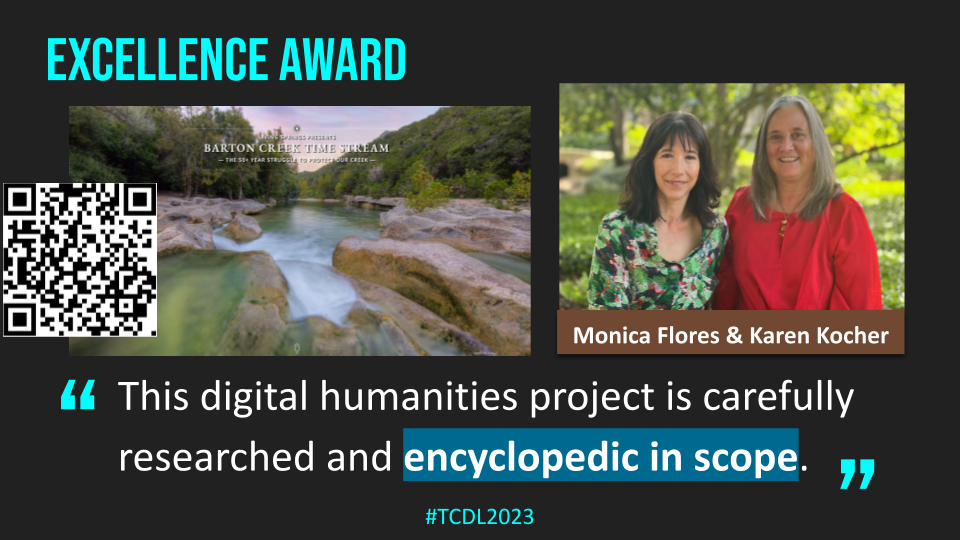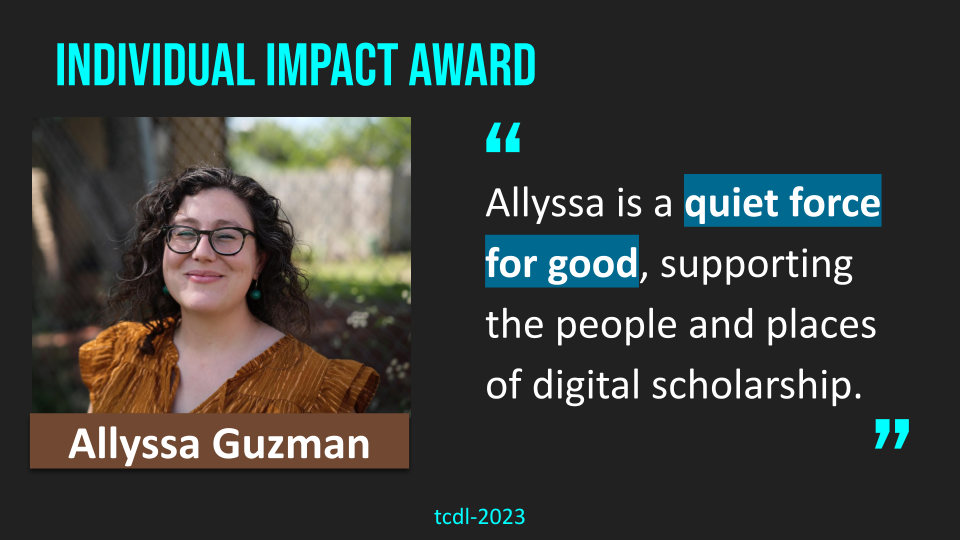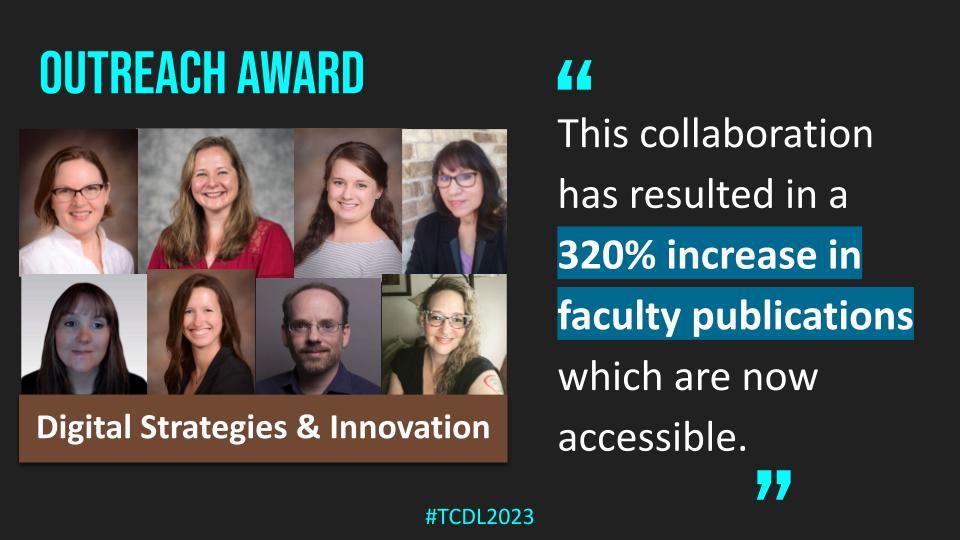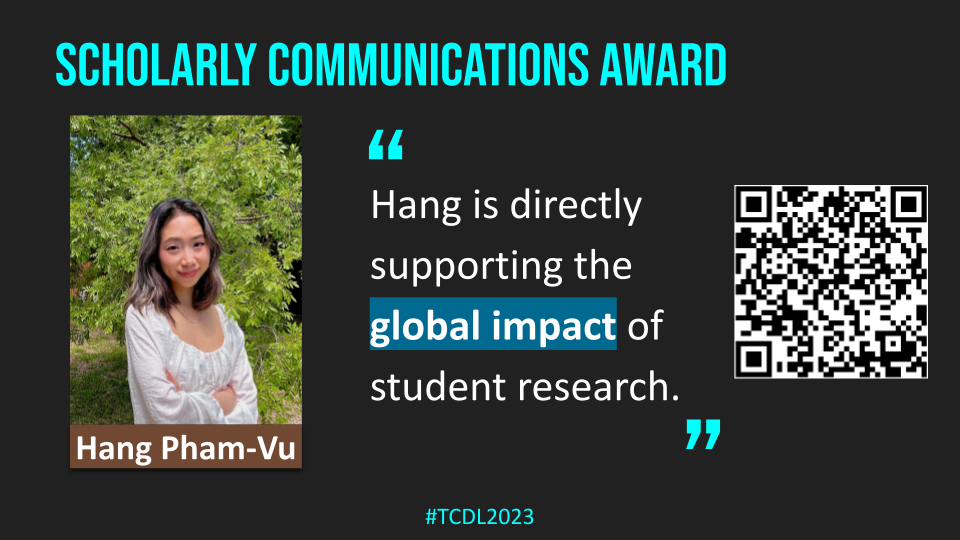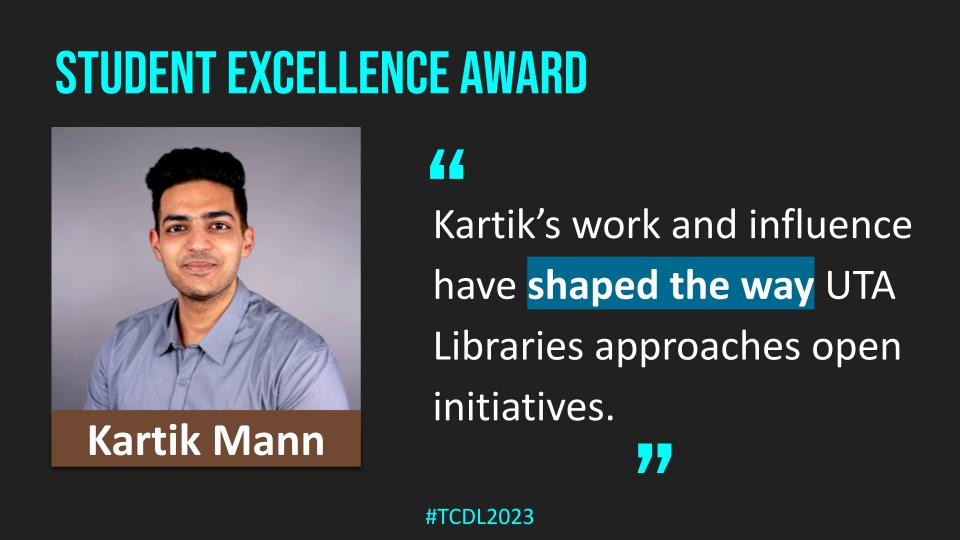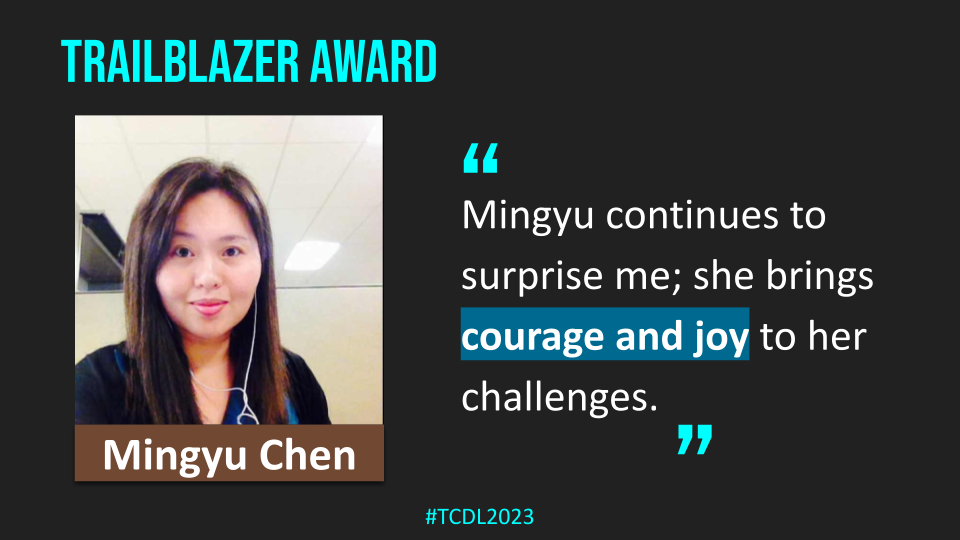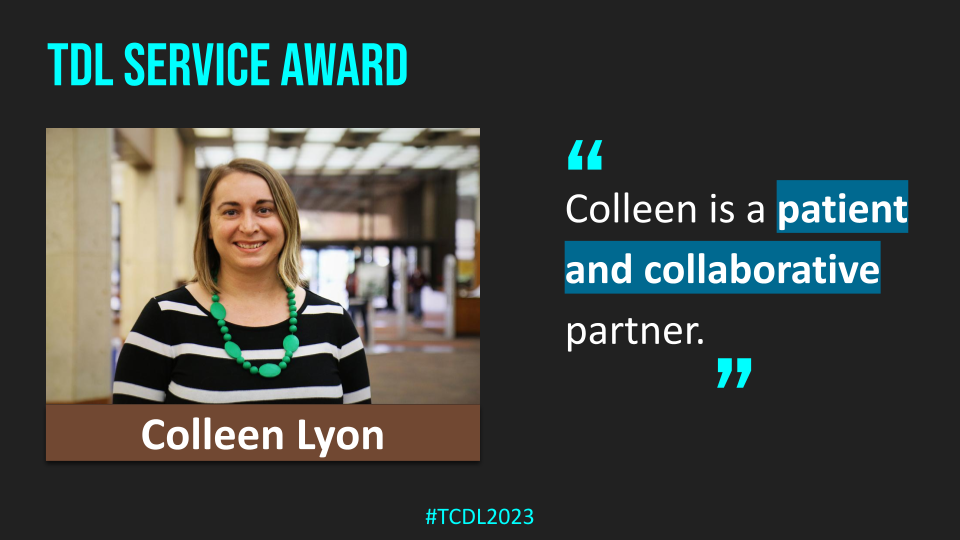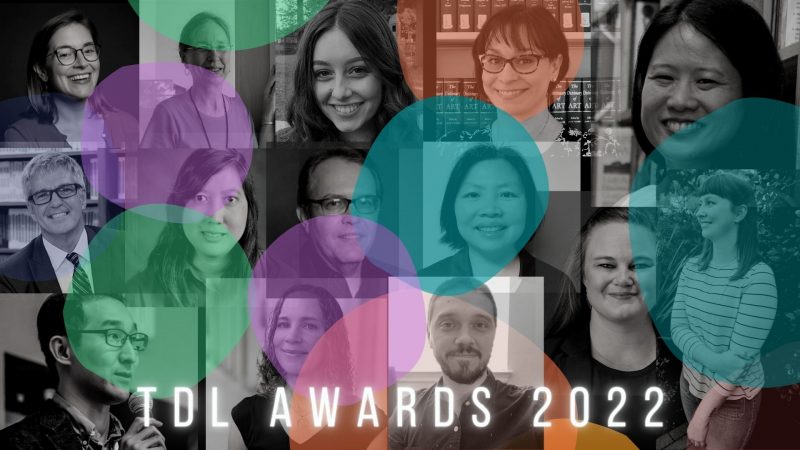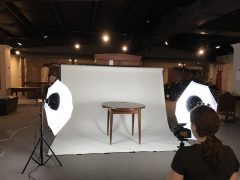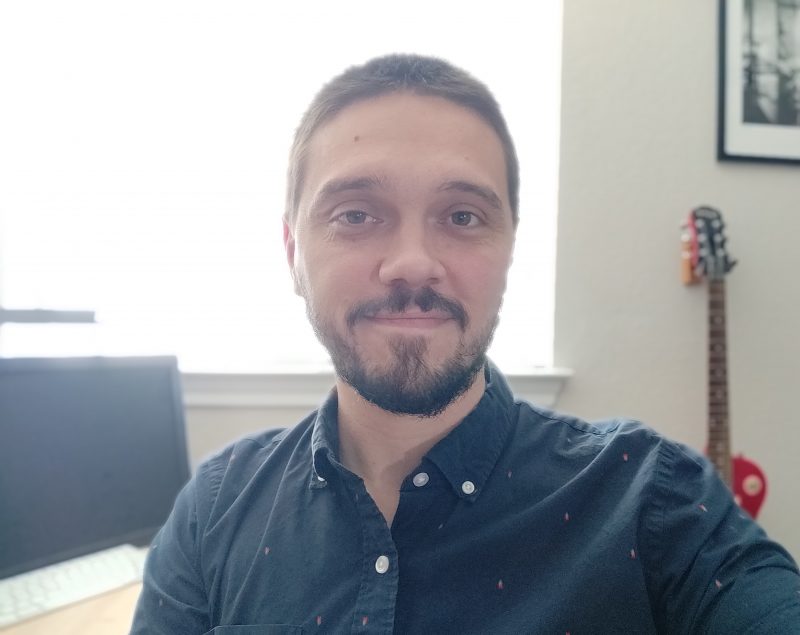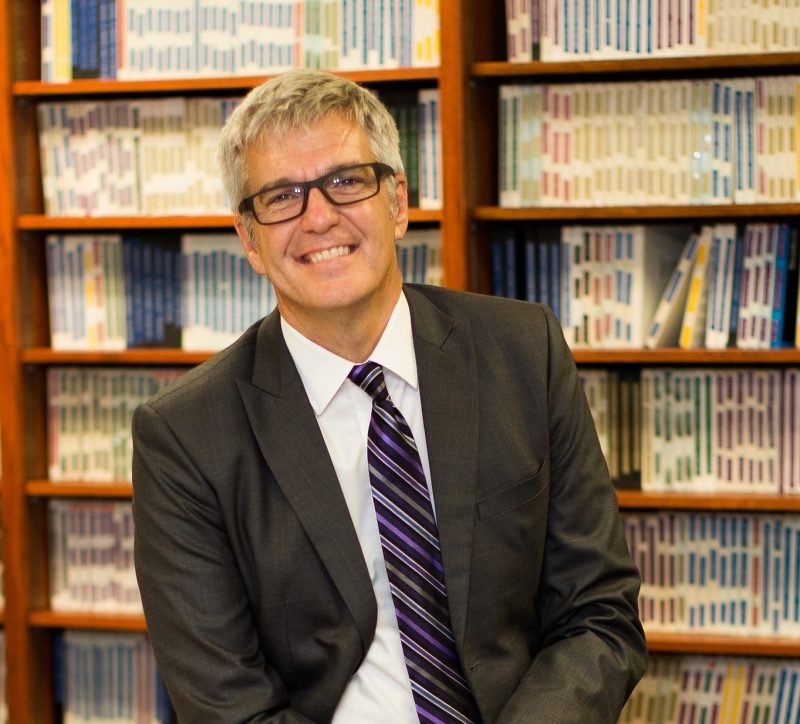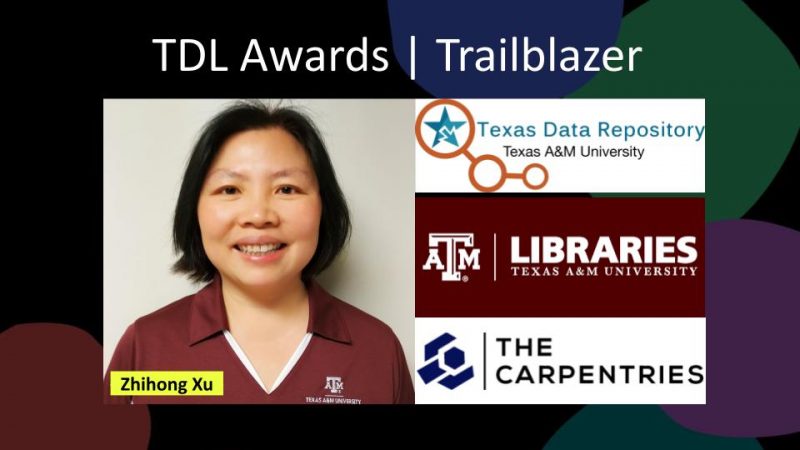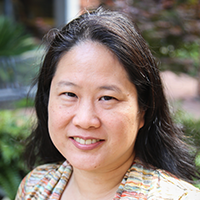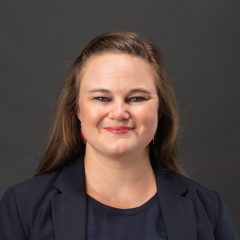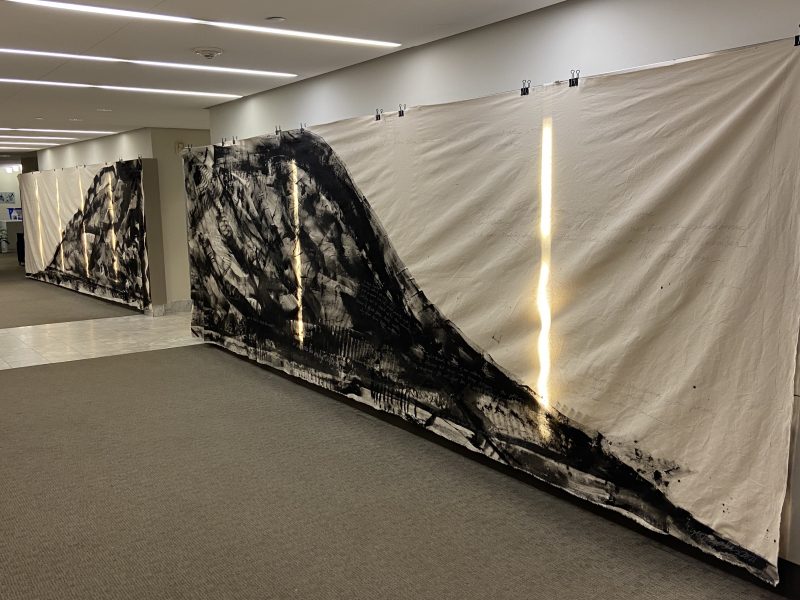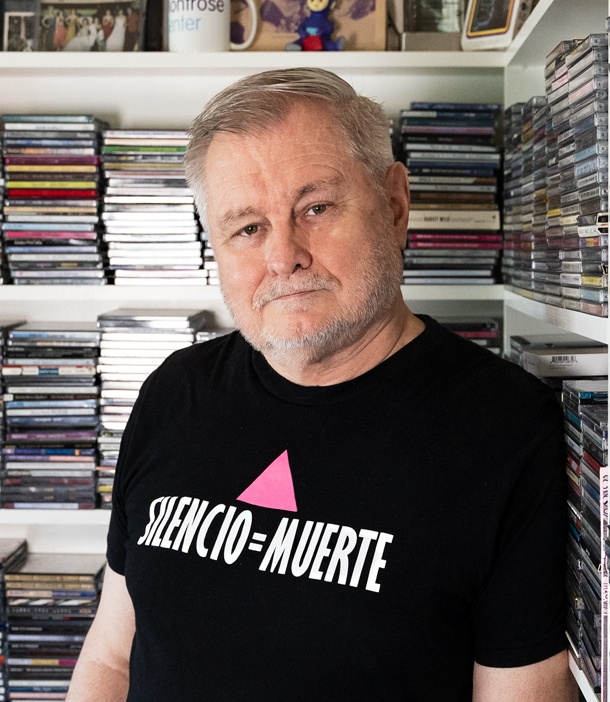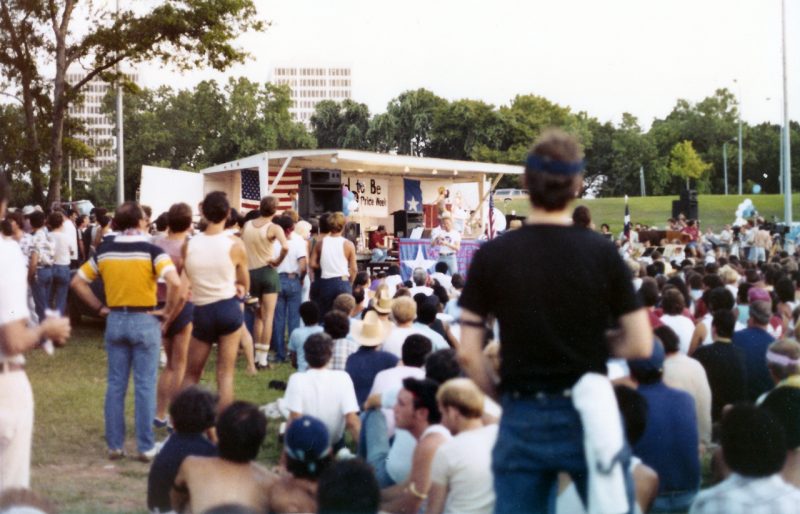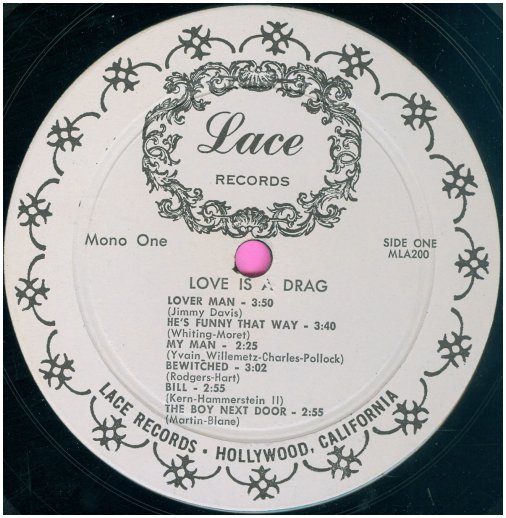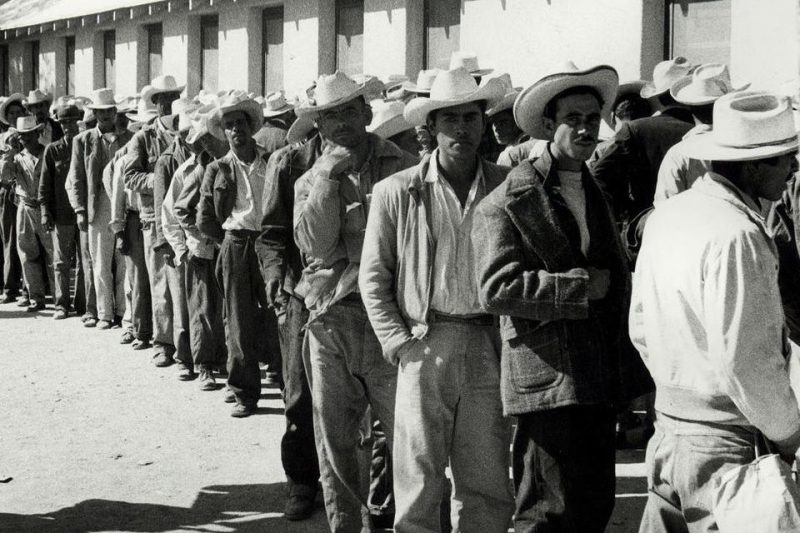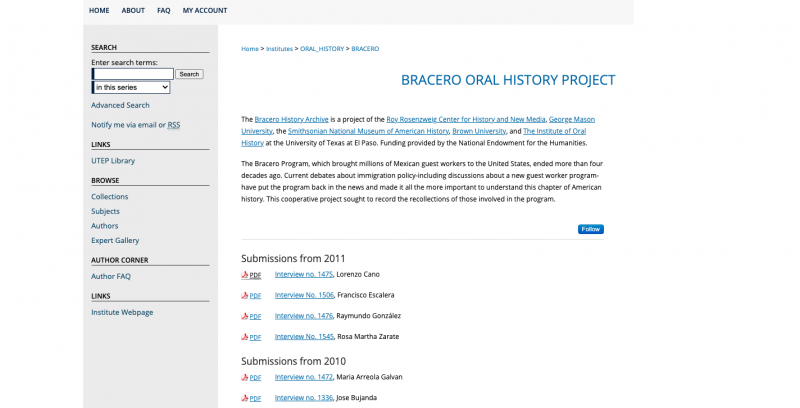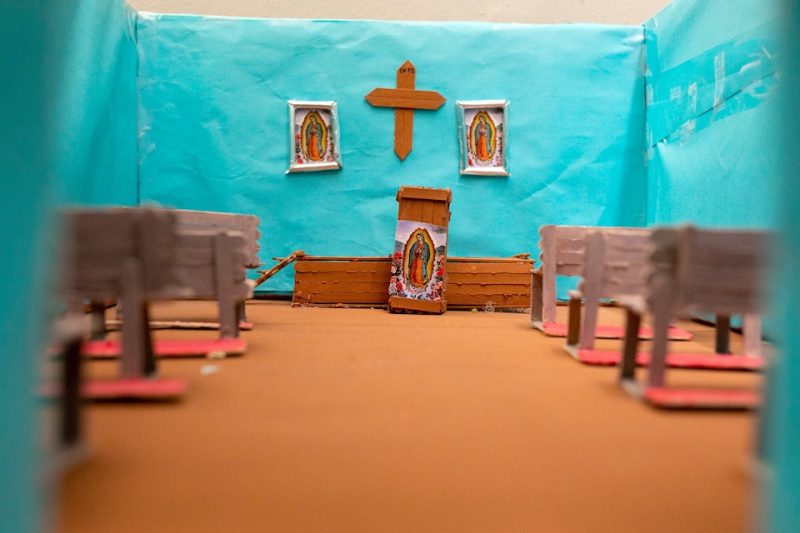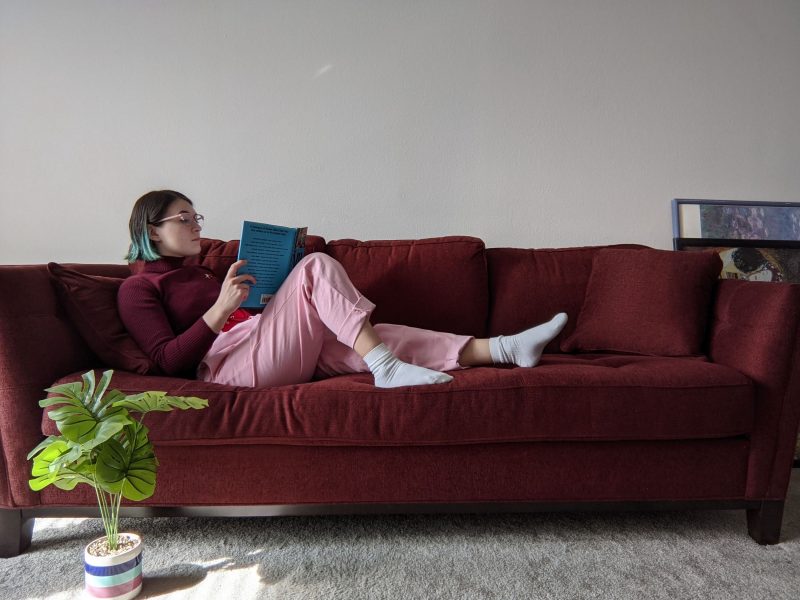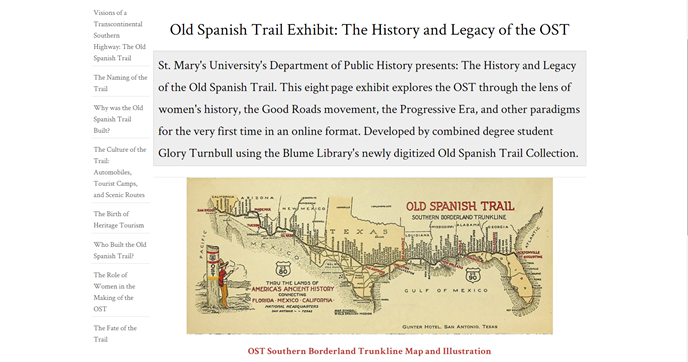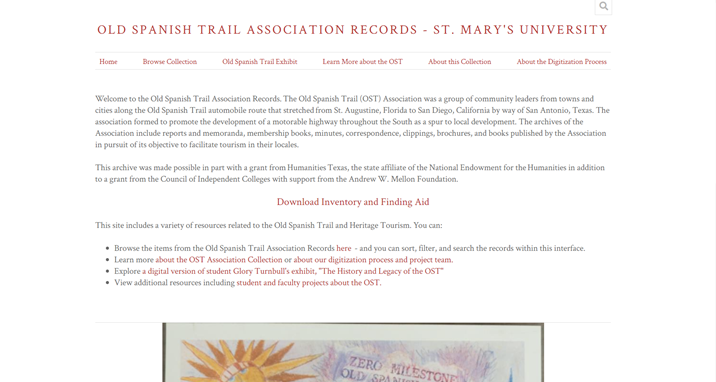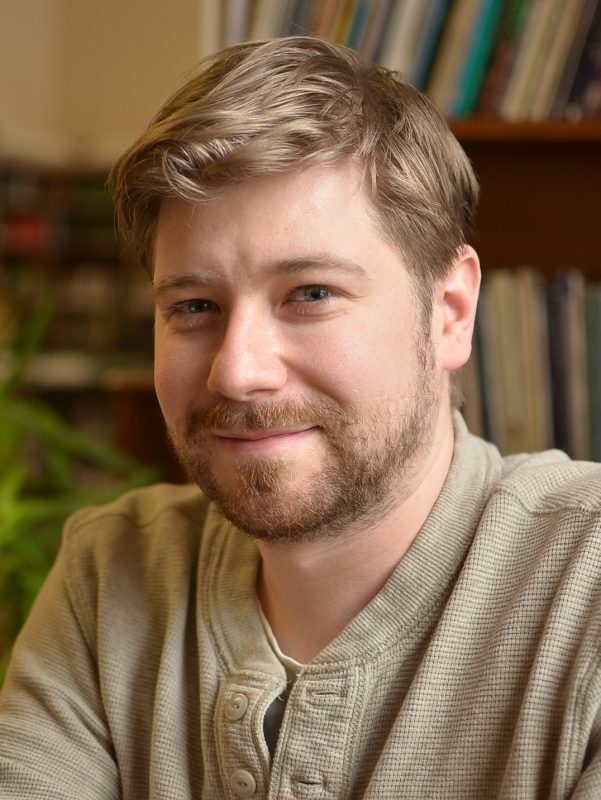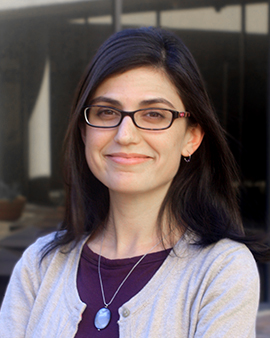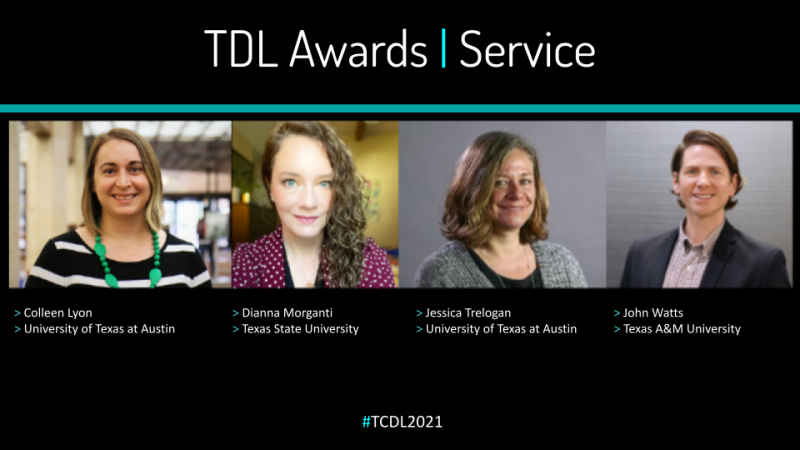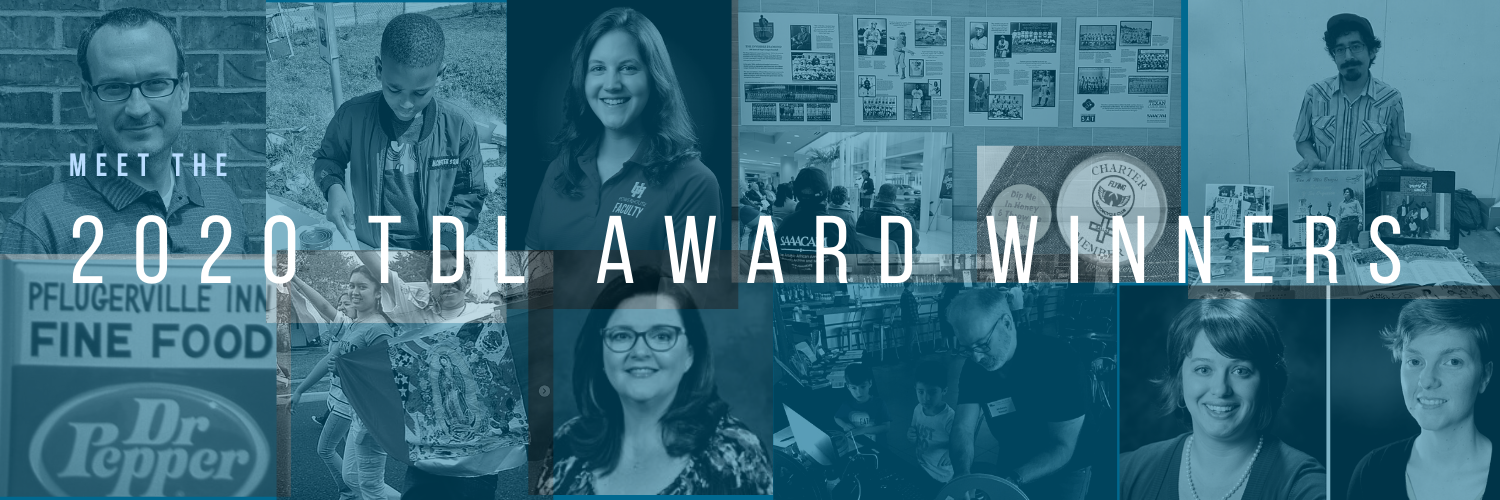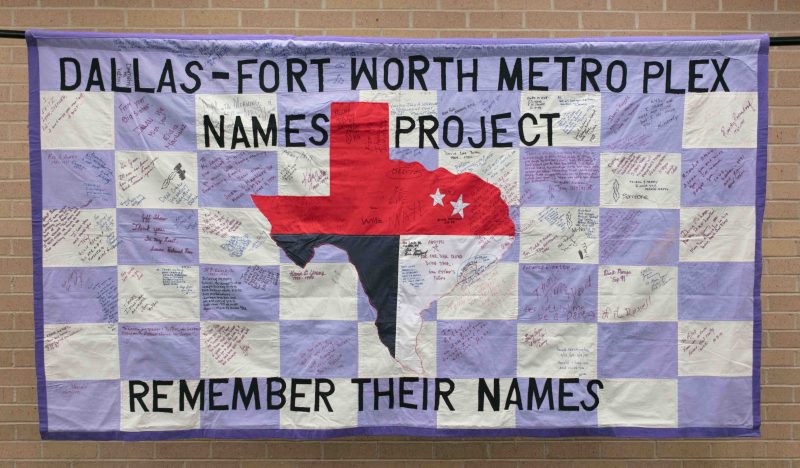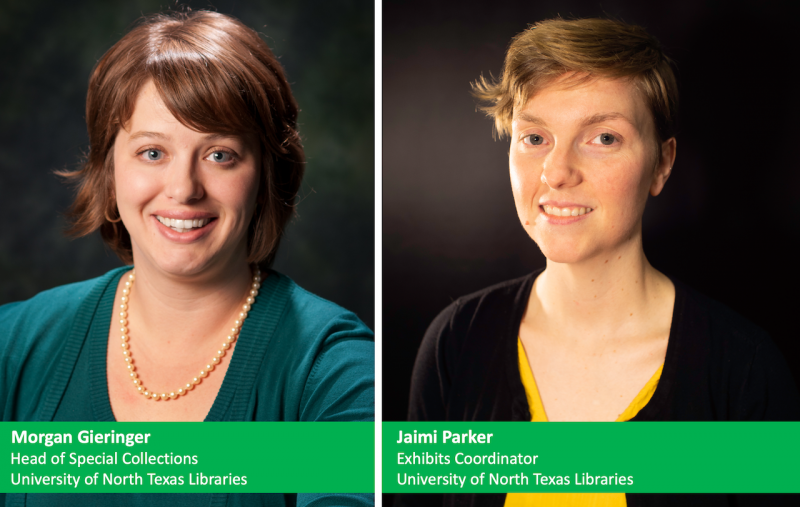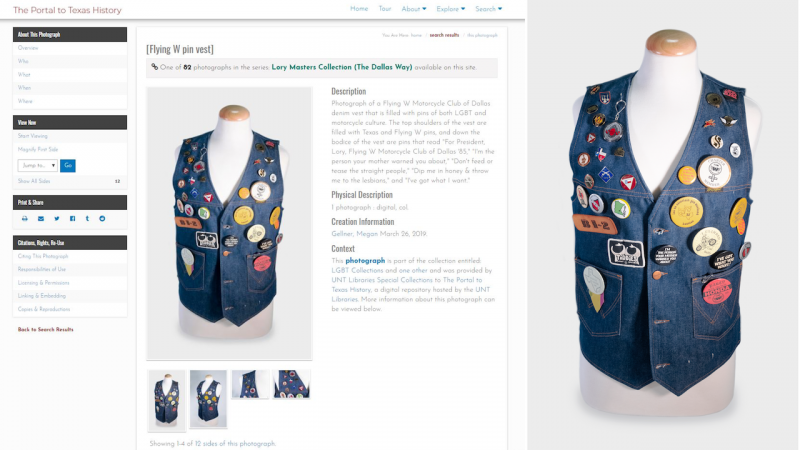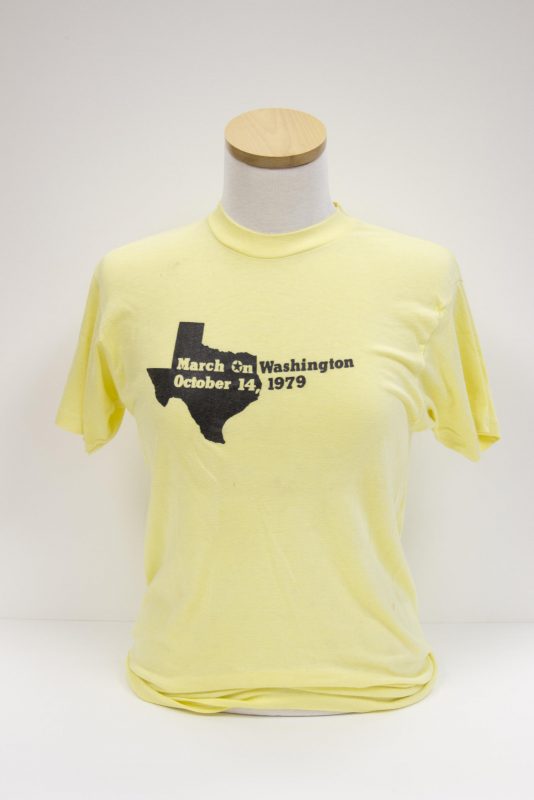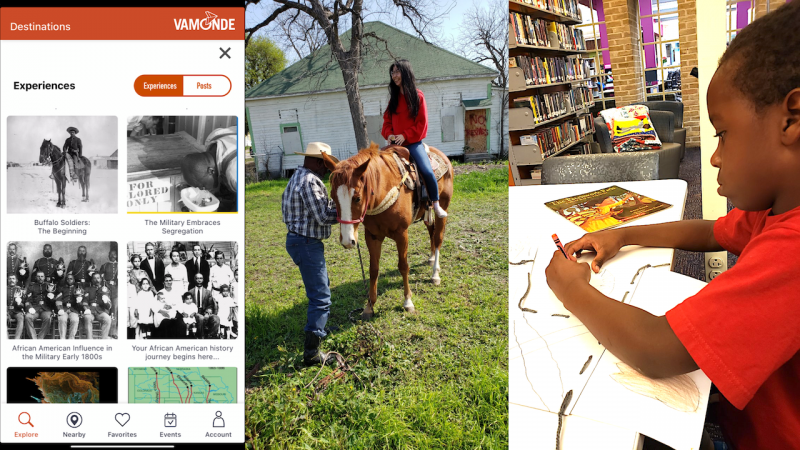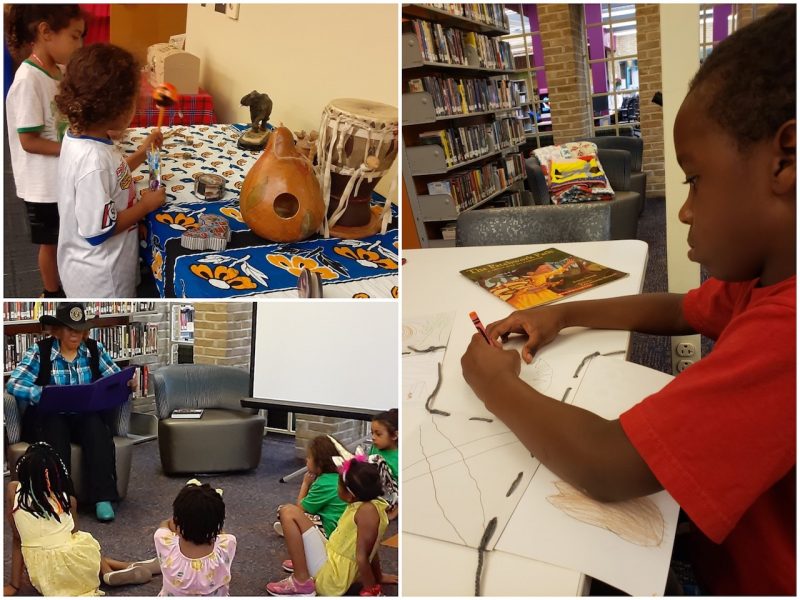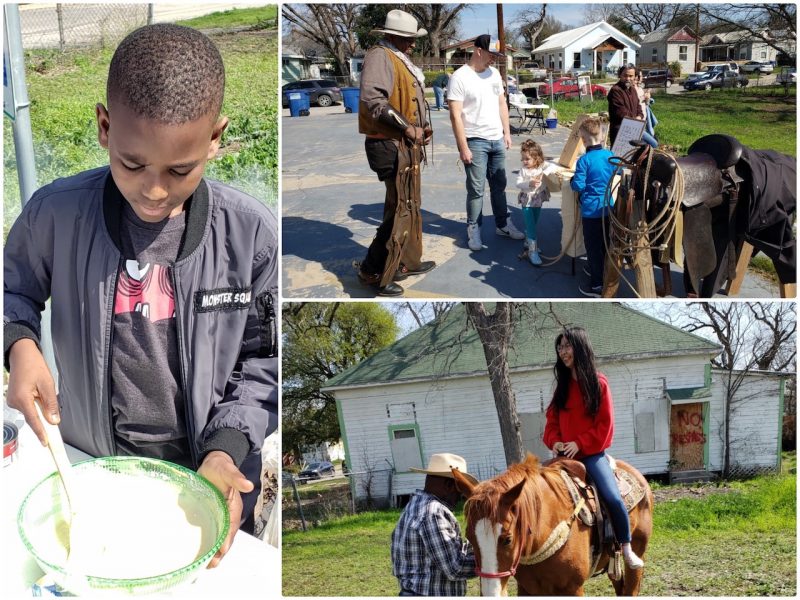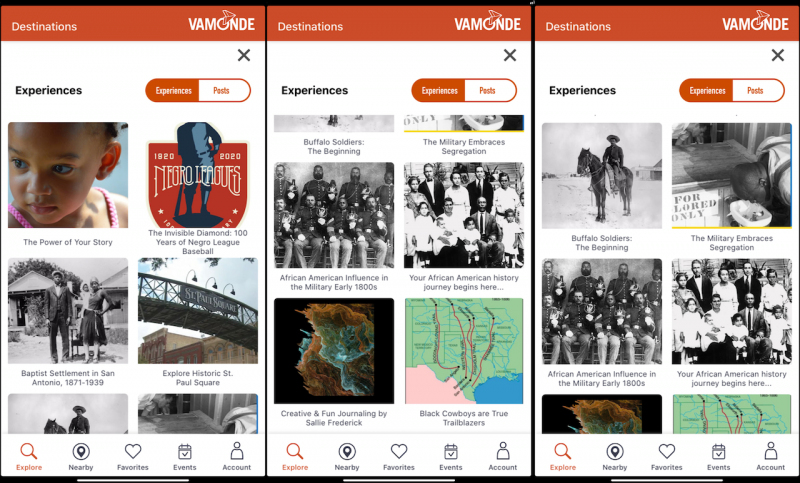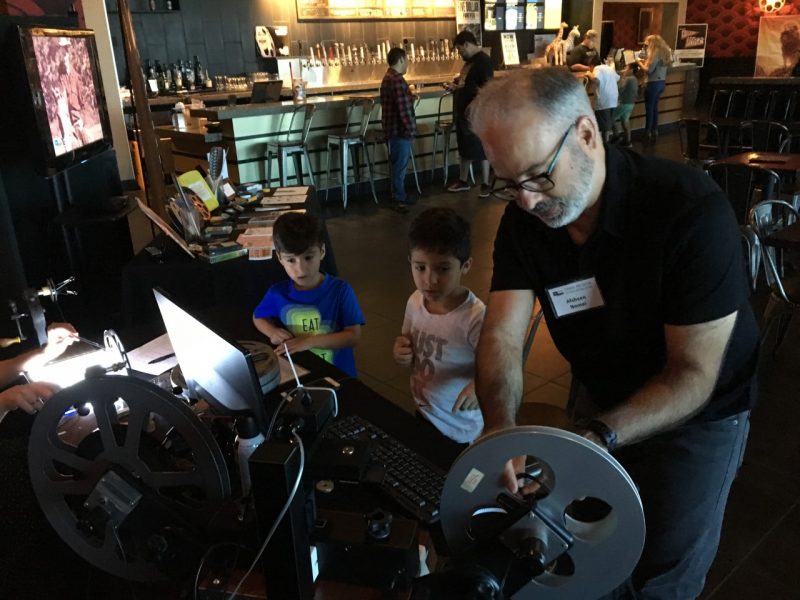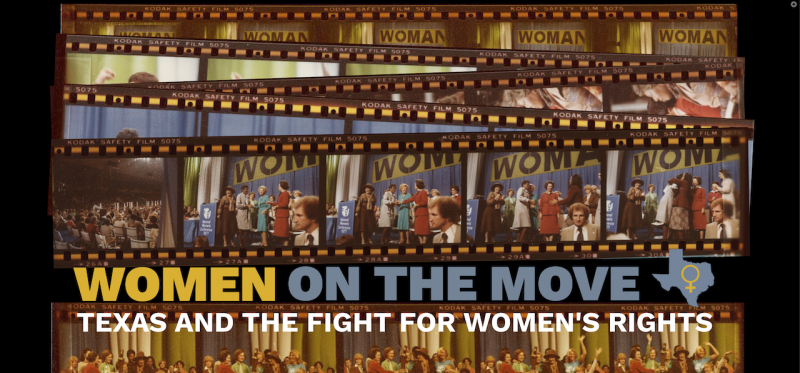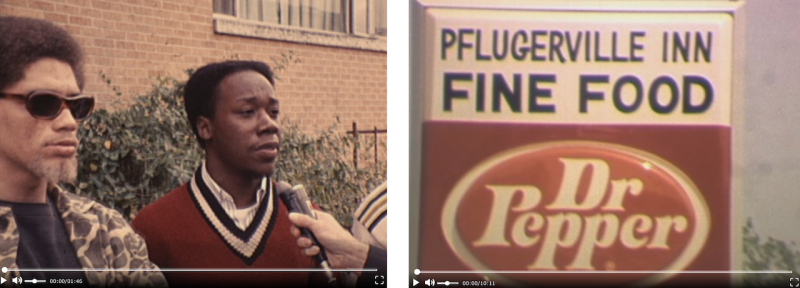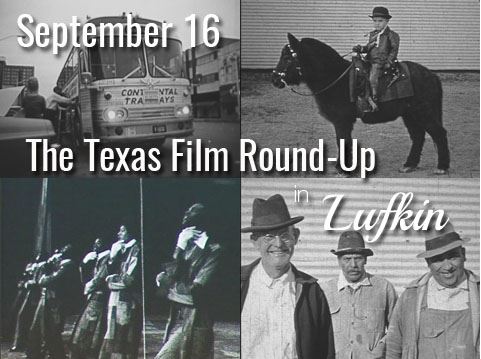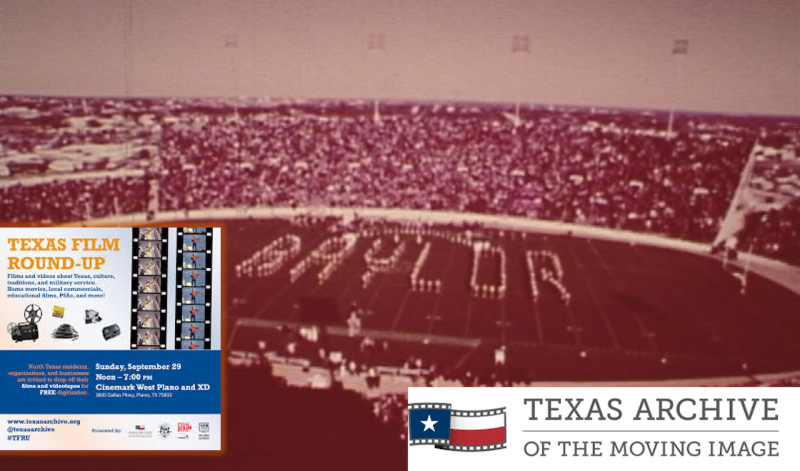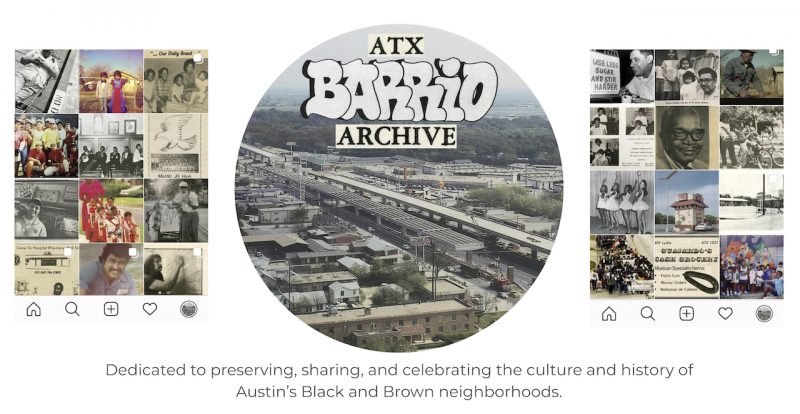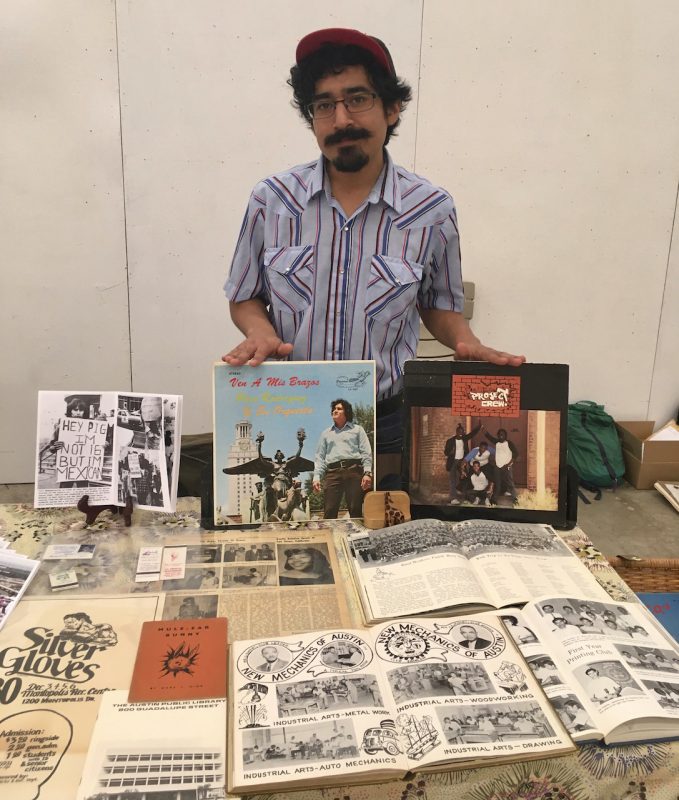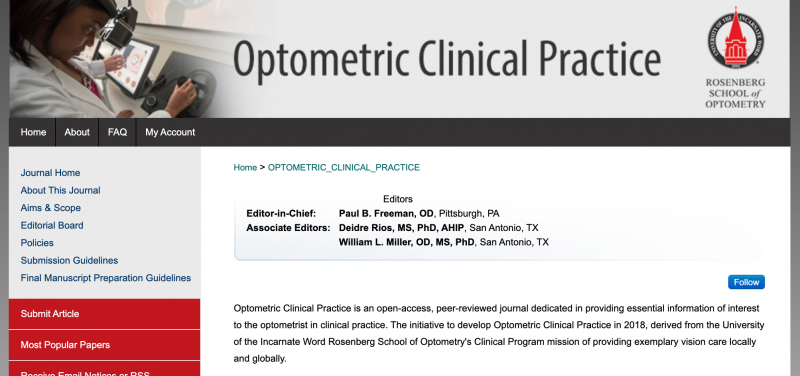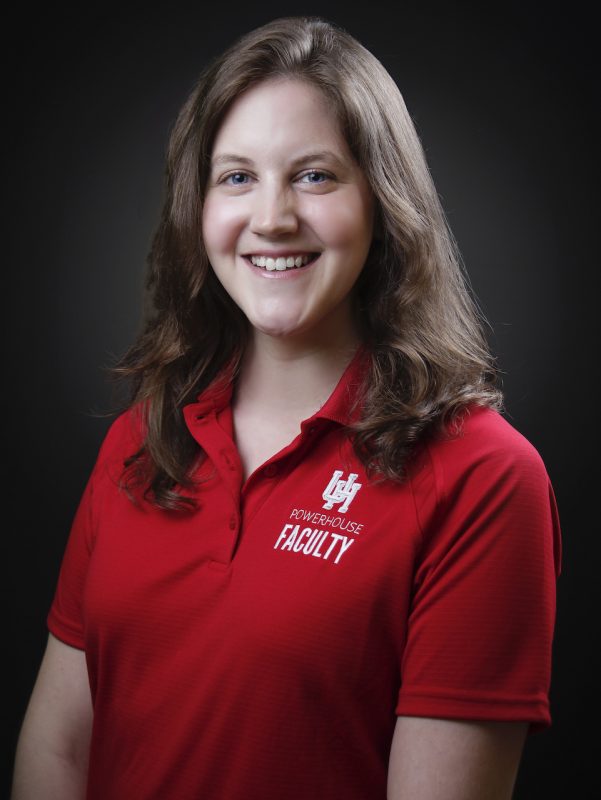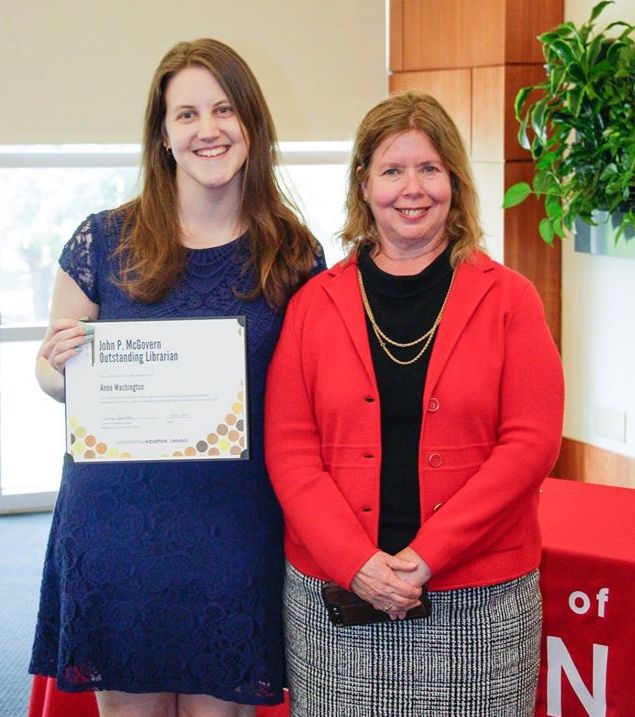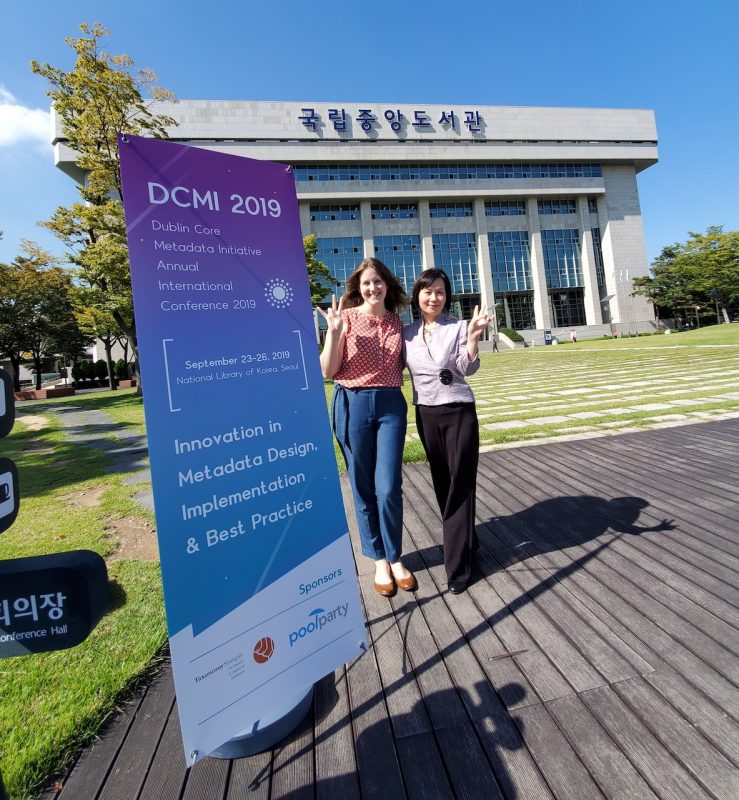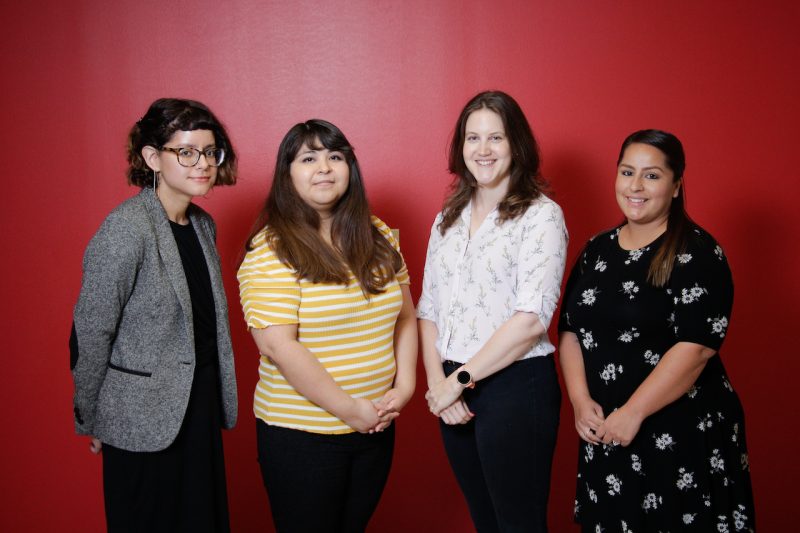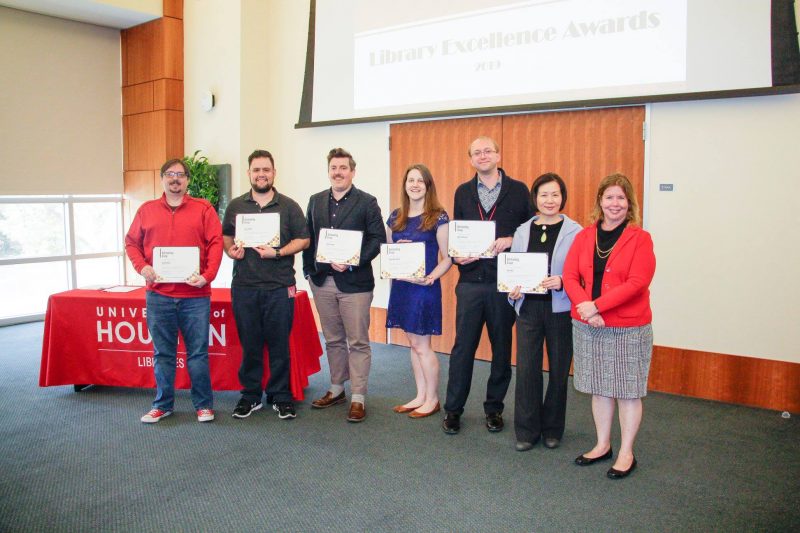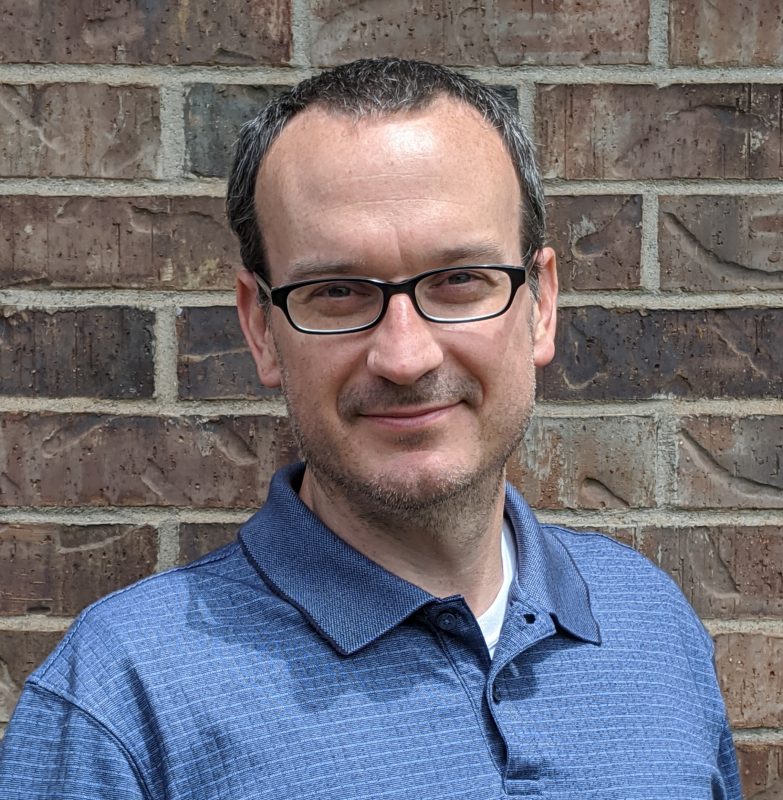View previous award winners 2023 | 2022 | 2021 | 2020 | 2019 | 2018 | 2017 | 2016 | 2014
Each year, the Texas Digital Library Awards honor individuals and groups that have made outstanding contributions to the advancement of digital libraries. Winners are selected by the TDL Awards Committee and are notified in early spring.
Recognizing that the community benefits from the work of many, the TDL Awards seek to acknowledge, support, and celebrate work done in this area. Each year, the TDL Awards honor individuals and groups that have made outstanding contributions to the advancement of digital libraries. Digital libraries is defined broadly to include access to digital collections in academia as well as from allied organizations such as museums, archives, historical societies, and other cultural heritage institutions.
2023 TDL Award Winners
Excellence Award | Individual Impact Award | Outreach Award | Scholarly Communication Impact Award | Student Excellence Award | Trailblazer Award | Service Award
Excellence Award
Monica Flores & Karen Kocher, Barton Creek Time Stream
The TDL Excellence Award honors a specific project that demonstrates overall excellence in one or more areas of digital curation or digital library practice.
The winners of the 2023 Excellence Award are Monica Flores and Karen Kocher for their work on the Barton Creek Time Stream.
Austin’s Barton Creek has played an outsized role in the city’s political life and in Austin’s identity as a city with environmental values at its core. The history of Barton Creek protection efforts has influenced the make-up of the Austin City Council, the creation of citizen boards and commissions, and the first office of environmental oversight. Efforts to protect the Creek have resulted in thousands of acres of preserved land and the strongest water quality ordinance in the nation.
Monica and Karen created a digital archive for use by researchers, scholars, educators, students, advocacy groups, outdoor enthusiasts, and the community-at-large. The result of their work is the interactive digital web site, Barton Creek Time Stream.
The interactive timeline comprises more than 90 richly documented events beginning in the early 1950s, transporting the user through 6 decades of advocacy efforts, providing archival imagery, documents, reports, newspaper clippings, political cartoons, maps, oral histories and quotes from citizens of the day.
The Barton Creek Time Stream offers curated content from over 30 private and public archival collections representing collaboration with the Austin History Center, Austin American-Statesman, the City of Austin, Austin Chronicle, environmental organizations and civic groups, and dozens of individual citizens who contributed from their own personal archives.
Monica and Karen’s goal for the project was to educate and inspire civic engagement. They collaborated with educators creating lesson plans and dozens of educators have downloaded the curriculum. These teachers serve over 3,000 AP Environmental Science students in Central Texas. Furthermore, the Barton Creek Time Stream connects site users to the websites for the many advocacy groups.
The Barton Creek Time Stream is a unique, innovative, and collaborative work of digital scholarship that benefits everyone in the present day and for many years to come.
Links:
Individual Impact Award
Allyssa Guzman, University of Texas at Austin
The Individual Impact Award celebrates an individual who has made significant contributions and improvements to the field, demonstrated through leadership in digital initiatives and / or the development of students and early-career professionals.
The winner of the 2023 Individual Impact Award is Allyssa Guzman, Digital Scholarship Librarian at the University of Texas at Austin.
Allyssa has served as a supervisor and mentor for three cohorts of Diversity Resident Librarians at UT Austin since 2018. She has developed a program focused on personal and professional growth for the Residents. She implemented meaningful change and improved the program by extending the program from two to three years to better serve the Residents in their job search. And to our benefit, Allyssa offered her guidance as Texas Digital Library launched their inaugural ACRL Diversity Resident program.
In addition to her leadership in the Residency program, Allyssa has led work on developing the new Scholars Lab at UT Austin. The Scholars Lab at UT Libraries will provide space and opportunities for learning, consultation, collaboration and research presentation to enhance multidisciplinary research and digital scholarship. Allyssa embodies the rare ability to take the long view and invoke strategies towards positive change in libraries while diligently making an immediate positive impact in her work every day.
Allyssa is a quiet force for good in supporting and sustaining the people and places of digital scholarship. UT Libraries – and the students and scholars it serves – will benefit from Allyssa’s work for many years to come.
Links:
- UT Libraries Scholars Lab: https://www.lib.utexas.edu/study-spaces-technology/scholars-lab
- UT Libraries website: https://www.lib.utexas.edu/
Outreach Award
Digital Strategies & Innovation at Texas Woman’s University Libraries
The Outreach Award honors an individual or team that demonstrates a creative, innovative, and successful approach to increasing accessibility of digital information, promoting engagement among new users, or increasing public awareness of an organization’s digital collections.
The winner of the 2023 Outreach Award is the Digital Strategies & Innovation team at Texas Woman’s University Libraries. Team members include Susan Whitmer, Amanda Zerangue, Ginger Garza, Julie Reed Sullivan, Adrian Shapiro, Kristin Clark, Erik Martin, Elizabeth Headrick, and Sean Spear. This team leads initiatives and campus collaborations in the areas of scholarly communication, digitization, online digital collection creation and metadata, digital preservation, digital literacy, Open Educational Resources (OER), digital equity, journal creation, digital humanities, assessment, and library website design.
For one of their long-term projects, Project Index, the team collaborated with faculty to review their CV and archive any scholarly content in the Repository@TWU. In the last five years, this collaboration has resulted in a 320% increase in faculty publications which are now accessible. For many faculty, this is the first time they have heard of Repository@TWU with the team doing all of the behind-the-scenes work to ensure copyright compliance and archiving, plus increased exposure to TWU’s scholarly output.
Another team project, titled Developing Digital Competencies, recognized gaps in digital competencies among staff and provided training in a safe and flexible learning space for critical engagement with digital technologies. As part of this project, team members hosted a speaker series and a lab space consisting of laptops and hotspots available for long-term borrowing. By promoting engagement among staff and new users, this work continues to serve as valuable outreach for the library, increasing awareness of the digital services available to the community, and providing lifelong opportunities for learners. Their intentional efforts to bridge the digital divide remain innovative and ongoing.
Links:
- Texas Woman’s University Libraries: https://twu.edu/library/
- The Repository@TWU: https://twu-ir.tdl.org/
Scholarly Communications Impact Award
Hang Pham-Vu, University of Texas at Arlington
The Scholarly Communication Impact Award honors an individual or group that has demonstrated leadership in or advancement of scholarly communication.
The winner of the 2023 Scholarly Communications Award is Hang Pham-Vu, Library Specialist for Digital Publishing at the University of Texas at Arlington.
When the committee read Hang’s nomination we felt like we could so relate to her, as she embodies the qualities we as librarians see in ourselves and our teammates. She is adaptable, responsible, resourceful, giving, and shows endless potential.
Each semester, Hang routinely ensures that ETD submissions are properly submitted, embargoed, and published. But after her supervisor left, Hang took on more responsibilities, including uploads to the UTA DSpace repository, communication with open access journal editors and authors, and completing production of journal issues. These were tasks that she previously shared with her supervisor, but she stepped up to cover all of the gaps.
Hang even made time to train new staff on software platforms used for digital publishing including DSpace, Vireo, and Open Journal Systems. She has been an invaluable team member in problem solving several needs with these platforms, and serves as a resource for user permissions and workflow knowledge.
For the first time, Hang took on the production of a full journal issue on her own, dedicating her focus to copy edit, design, process, and enhance the 2022 issue of the McNair Scholars Research Journal (MSRJ). She ensured that students’ writing was presented professionally. She also ensured that the journal’s design follows the tradition of the McNair Scholars, working cross-departmentally with UTA Libraries’ Marketing and Communications team. This experience required that Hang apply all her project management and time management skills, as well as her expertise from her English degree and publishing experience.
Links:
- McNair Scholars Research Journal: https://rc.library.uta.edu/uta-ir/handle/10106/26328
- Research Commons home: https://rc.library.uta.edu/uta-ir/
Student Excellence Award
Kartik Mann, University of Texas at Arlington
The Student Excellence Award honors an individual student who has demonstrated overall excellence and significant contributions to digital library practice.
The winner of the 2023 Student Excellence Award is Kartik Mann, Graduate Associate in the Department of Open Partnerships & Services at the University of Texas at Arlington Libraries.
Kartik is an international graduate student from India with an MBA and computer science degree who has worked with UT Arlington Libraries for four and a half years and has applied his talents to different aspects of the department, from open educational resources to open journal systems, from repositories to electronic theses and dissertations.
Kartik understands the importance of clear communication and of maintaining standards. He recently helped the team resolve an issue in their DSpace repository that required immediate attention to ensure standards of copyright permissions were met. Kartik also applied his technical knowledge to redefine embargoes for ETDs and embed video in OJS. Furthermore, Kartik is a thoughtful participant in departmental meetings, contributing to discussions about the expansion and improvement of the libraries’ social media presence and the importance of open access publishing for educational affordability.
Kartik developed training and workshops for the Open Educational Resources department on how to publish using Pressbooks. He guided many faculty members and student contributors in the development of OER with patience and insight. He personally assisted with at least a dozen OER projects and is acknowledged by the authors in at least five for his extensive support. The OERs that Kartik contributed to have been used by hundreds of thousands of users globally. He has made an incredible impact!
Kartik clearly cares about his job and wants to do it well. He exemplifies a graduate student who contributes to our Libraries well beyond what is expected.
Links:
- Research Commons home: https://rc.library.uta.edu/uta-ir/
- UTA Pressbooks: https://uta.pressbooks.pub/
Trailblazer Award
Mingyu Chen, University of Texas at Dallas
The Trailblazer Award honors the work of an individual or group who has used limited resources in innovative ways to create, maintain, or support digital collections. TDL strongly encourages applications from libraries, archives, and cultural heritage institutions that may not have full-time staff dedicated to digital projects but that have found creative and innovative ways to develop a digital presence.
The winner of the 2023 Trailblazer Award is Mingyu Chen, Head of Metadata Services at the University of Texas at Dallas.
Mingyu has shown that she is undaunted by challenges, applying her wealth of leadership and technical skills to creatively problem-solve and implement solutions to critical challenges faced in digital library work.
Mingyu Chen is a mother, a caregiver, a leader, and an academic librarian dedicated to her team, her students, and her library. Mingyu has led dozens of projects that unify teams and tools at the Eugene McDermott Library.
Mingyu developed workflows to incorporate AI into cataloging, discovery, and reference; she built an acquisition workflow that enhanced the collaboration between the acquisition and metadata teams; and configured metadata systems that allowed her team to seamlessly monitor, edit, import, and verify metadata. During the pandemic, this workflow allowed UT Dallas to save time and money, made it easier to complete projects efficiently and remotely, and the workflow continues to benefit teamwork today.
Mingyu brings courage and joy to her challenges. For much of the past academic year, Mingyu has applied her vast knowledge and experience to keep her department afloat despite severe staffing shortages due to the post-pandemic turnover. She has volunteered with the Texas Digital Library’s TCDL Planning Committee for the past two years and in her personal time, she leads volunteer efforts to mentor middle-school youth in her city.
Thank you for bringing us joy and courage, Mingyu. Congratulations and we look forward to seeing what you accomplish next!
Links:
TDL Service Award
Colleen Lyon, University of Texas at Austin
The TDL Service Award is given at the discretion of TDL staff to recognize a member of our community who goes above and beyond in service to the TDL consortium.
The winner of the 2023 TDL Service Award is Colleen Lyon, Head of Scholarly Communication at the University of Texas at Austin.
Colleen, for the current year, has played an integral role in helping TDL staff and the TDL user community prepare for a major upgrade to our hosted repositories as a member of the TDL DSpace 7 Upgrades Task Force. She has also served as an exemplary inaugural rotation supervisor for our Resident Digital Librarian, Ima Oduok – providing crucial support for our fledgling Diversity Residency in Digital Libraries – and serving as a welcoming and supportive and expert supervisor to Ima on her DSpace rotation. Across these projects, Colleen contributed valuable time providing counsel, writing and reviewing documentation, preparing presentations, and testing software – all in the service of the TDL community and the library profession. These contributions alone merit the award.
However, TDL feels very strongly that this is an award that could have been received pretty much any year we have worked together. I don’t think I’m exaggerating when I say that every staff member at TDL is enthusiastically in support of offering this recognition. In all our service interactions, Colleen is a patient and collaborative partner. Our staff always know they can come to her with a question or a request for advice, and expect level-headed and clear-eyed answers. She lends her expertise in Open Access, copyright, and repository management willingly and with kindness to other TDL members. She advocates for TDL and acknowledges its contributions within UT Libraries and to folks outside the consortium. We – the TDL staff and membership – are truly fortunate to have Colleen on our team.
Links:
- UT Libraries https://www.lib.utexas.edu/
2022 TDL Award Winners
The 2022 TDL Awards winners represent a variety of institutions and projects. Archivists, digital scholarship, and open access champions at academic libraries and community archives from around Texas are among this year’s winners, showcasing the cross disciplinary and inter-institutional partnerships that libraries and archives leverage so well.
Texas Digital Library is proud to present this year’s TDL Award Winners. You can watch the 2022 Awards ceremony recording in the opening plenary session at the Texas Conference on Digital Libraries.
Excellence Award | Scholarly Communication Award | Individual Impact Award | Outreach Award | Trailblazer Award | Student Excellence Award | TDL Service Award
Excellence Award | William J. Hill Texas Artisans and Artist Archive
The TDL Excellence Award honors a specific project that demonstrates overall excellence in one or more areas of digital library practice.
The 2022 Excellence Award winner is the William J. Hill Texas Artisans and Artists Archive, at the Bayou Bend Collection and Gardens and the Museum of Fine Arts, Houston.
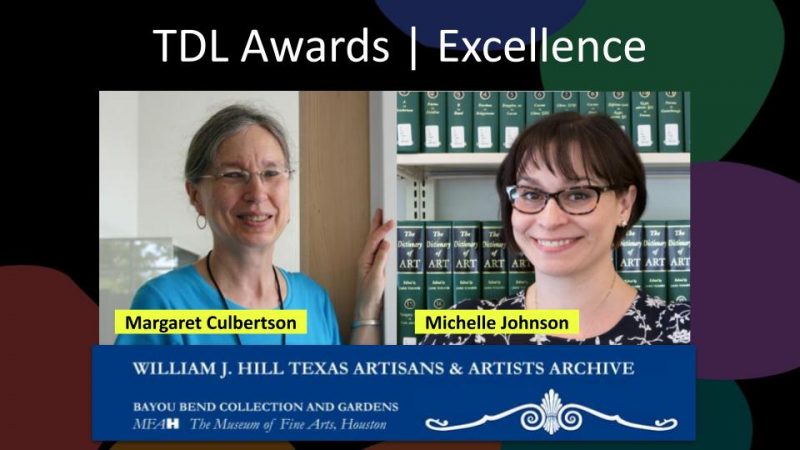
Screen share from the virtual 2022 TDL Awards Ceremony, honoring Margaret Culbertson and Michelle Johnson of the Hill Archive
Project Team Members:
- Margaret Culbertson, Project Director
- Michelle Johnson, Project Manager
The William J. Hill Texas Artisans and Artists Archive documents the lives, work, and products of Texas artisans and artists through 1900, with an emphasis on decorative arts, as well as painting, photography, and other media. The archive includes archival material, such as census records, city directory entries, and newspaper articles, and photographs of objects and artworks, from more than twenty partner institutions across the state, including archives, historic sites, museums, special collections libraries, universities, and private collections. Including these varied materials in one digital archive enables researchers to search and compare records and objects in innovative ways.
Working with their partner institutions, the Hill Archive team has devised ways to overcome metadata challenges presented by varying industry standards of description, documentation, and digitization. They have also developed workflows for metadata conversion to provide consistent, functional records, such as a process for uniformly applying both internally developed and industry-standard controlled vocabularies. Community outreach and engagement efforts have also been critical in the Hill Archive team’s work to develop a collaborative repository and strong partnerships.
Combining both object documentation and primary source research material in one platform opens up new research potential. Moreover, presenting historic records through the lens of artists and skilled craftspeople provides greater visibility of record collections unaffiliated with decorative arts and often overlooked by researchers. By partnering with a wide range of institutions and collections, including many that do not have digital repositories of their own, the Hill Archive makes valuable historical resources accessible to a wide audience.
Learn more about the William J. Hill Texas Artisans and Artists Archive.
Scholarly Communication Award | Texas A&M Libraries Scholarly Communications and Metadata Team
The Scholarly Communications Award honors the work of an individual or group of academics, including faculty and librarians, who have made significant advances in our understanding of the issues surrounding scholarly communications.
This year’s Scholarly Communications Award winners are the scholarly communications & metadata team at Texas A&M Libraries: D. J. Lee, Sarah Potvin, David Lowe, and Jeannette Ho.
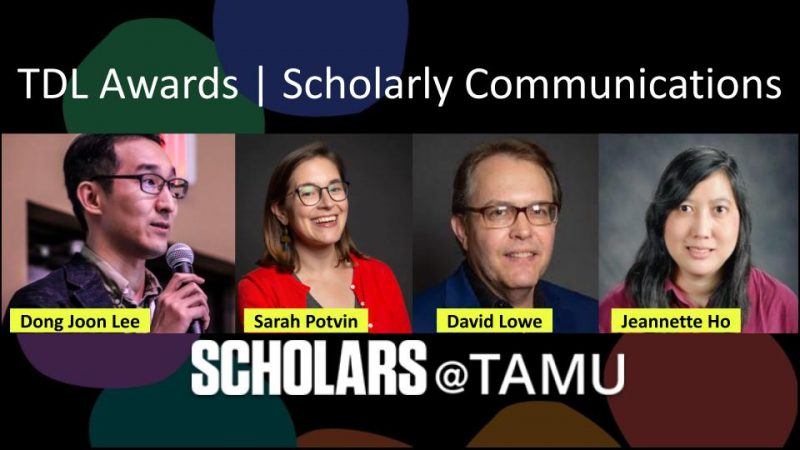
Screen share from the virtual 2022 TDL Awards Ceremony, celebrating Dong Joon (D.J.) Lee, Sarah Potvin, David Lowe, and Jeannette Ho
This team pursued a strategy of enhancing the interoperability of A&M’s scholarly communication systems to make them more useful to researchers over the past three years. These systems can be used to publish a range of documents in the OAKTrust Digital Repository, represent the publications on faculty Scholars@TAMU profiles, and collect engagement metrics for the publications. The success of their project led to significantly increased faculty engagement, encouraging A&M’s faculty to curate many other documents in A&M’s repository.
See the amazing work done by the Scholars@TAMU team at Texas A&M Libraries.
Individual Impact Award | Michael Shensky
The Individual Impact Award honors an individual who has made significant contributions and improvements related to the field of digital curation and digital scholarship. Nominees demonstrated their impact by fostering the development of students and early career professionals, facilitating communities, building infrastructure, and/or contributing to scholarship.
This year’s Individual Impact winner is Michael Shensky, Head of Research Data Services at University of Texas at Austin.
Michael was nominated by members of TDL’s GIS Interest Group, for his work with building this group over the last two years. Building from a birds-of-a-feather session on geographic information systems (GIS) in 2020, Michael saw a need where a new community could grow. Gathering the many attendees from the GIS meeting, he organized a statewide Interest Group, building subcommittees and developing a sustainable structure for the group.
As the initial leader of the Interest Group, Michael was particularly thoughtful in creating a welcoming environment for everyone to feel like they had a place to be involved, regardless of expertise or affiliation. He created opportunities for anyone with the interest to get involved and contribute to the group’s work. His enthusiastic and inclusive leadership of the group has contributed to making the GIS Interest Group an active and engaged part of the TDL community.
Get involved with TDL’s GIS Interest Group and learn more about the collaboration Michael started.
Outreach Award | Stephen Sloan
The Outreach Award honors an individual or team that demonstrates a creative and successful approach to reaching new users and building awareness of an organization’s digital collections.
The winner of the 2022 Outreach Award is Stephen Sloan, for his work on Waco History.
Dr. Stephen Sloan is the Director of the Institute for Oral History and Associate Professor of History at Baylor University. He founded and leads Waco History, a collaborative outreach project between the Institute for Oral History and The Texas Collection – both housed at Baylor. Using the over 6,000 oral history recordings from the Institute for Oral History and The Texas Collection’s wealth of historic images, the Waco History website and app makes the history of Waco come alive through digital collections and curated narratives that highlight the city’s history, heritage, and culture.
Stephen has led the Waco History team in developing 183 place-based stories, which incorporate historic images and oral history excerpts. He has presented about Waco history to a range of audiences and introduced the Waco History app community leaders, local groups, Baylor students, and K-12 educators. The Waco History project helps bring the collections of the Institute for Oral History and The Texas Collection to the community in an innovative and effective way that places new value on archival resources.
Explore Waco History through historic photos and oral histories of Waco’s citizens.
Trailblazer Award | Zhihong Xu
The Trailblazer Award honors the work of an individual or group who has used limited resources in innovative ways to create, maintain or support digital collections.
This year’s trailblazer is Zhihong Xu of Texas A&M Libraries.
Dr. Zhihong Xu is the Data Management Librarian at Texas A&M Libraries. Zhihong has been a strong supporter of the projects of the Texas Data Repository and the Texas Digital Library’s Carpentries pilot project. She served as a cohort train-the-trainer instructor of the Carpentries project and became certified as an instructor of The Carpentries R curriculum. When it came time to find an instructor for TDL’s first Carpentries workshop, Zhihong stepped up and became the first of TDL’s Carpentries cohort to serve as a workshop instructor, blazing the trail with her expertise, her willingness to lead, and her teamwork.
In addition to her work with the Carpentries, Zhihong also led a usability study for the Texas Data Repository that will help improve both the repository and the training for its users.
You can learn more about Dr. Xu on her profile at Scholars@TAMU.
Student Excellence Award | Misha Coleman, Ali Gunnells, and Chloe Santiago
The Student Excellence Award honors undergraduate or graduate students who demonstrate overall excellence and contributions to digital library practice.
The 2022 Student Excellence Award goes to Misha Coleman, Alexandra (Ali) Gunnells, and Chloe Santiago for their work on the project, “What is Digital Librarianship?”
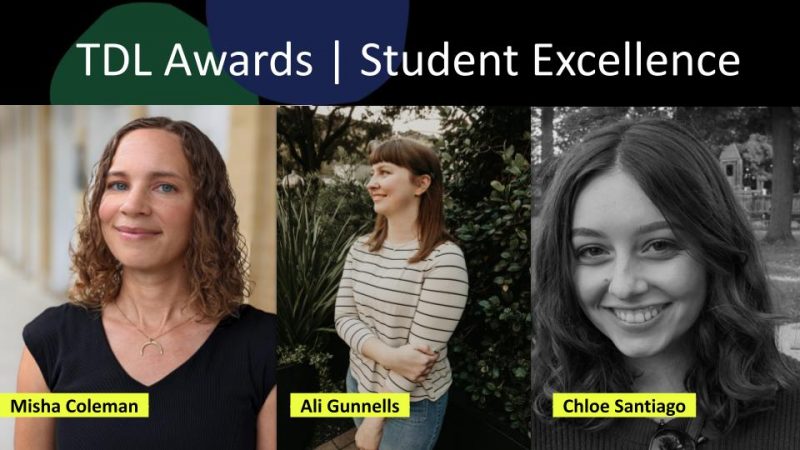
Screen share from the virtual 2022 TDL Awards Ceremony, recognizing Misha Coleman, Ali Gunnells, and Chloe Santiago
Together, Chloe, Ali, and Misha interviewed seven librarians and archivists from the Texas Digital Library community about their daily work, professional backgrounds, and challenges. They coordinated, conducted, recorded, edited, transcribed, and published the interviews in TDL’s repository. Taken as a whole, the interviews provide an overview of the field of digital librarianship, demonstrate the variety of roles that digital librarians fill, and will serve as a valuable resource for promoting this area of library work. The interviews are available in TDL’s DSpace repository.
Chloe, Ali, and Misha are all recent graduates of UT Austin’s School of Information.
COMING SOON: TDL will be publishing the “What is Digital Librarianship” interviews on our YouTube channel.
TDL Service Award | Christina Chan-Park and Alexa Hight
The TDL Service Award is given at the discretion of the Texas Digital Library to an individual or group at a member institution doing exceptional work in the service of the Texas Digital Library consortium.
This year we are pleased to present the TDL Service Award to two of our members: Christina Chan-Park and Alexa Hight.
Dr. Christina Chan-Park is the STEM Librarian Coordinator at Baylor University. Christina has been indispensable to the growth of the Texas Data Repository Dataverse (TDR) and the strength of its Steering Committee in her term as BearData liaison.
When Christina served as chair of the Texas Data Repository Steering Committee (TDR SC) for Texas Digital Library, she kept our institutional liaisons and colleagues on task towards our collective goals. As leader of the Steering Committee’s Assessment group, she has led the creation of thorough and attractive usage reports for the collective TDR as well as for each individual institution. Using those reports and her deep knowledge of TDR SC projects, she has also led the creation of updates that TDL has provided to the Global Dataverse Community Consortium and the lead developers at Harvard for their annual meetings. Christina launched a comprehensive user survey that just recently concluded, and its results will help direct the TDR Steering Committee’s project roadmap as well as help refine the objectives of the global Dataverse community of users.
She delegated a logo redesign to designers at Baylor that is adaptable for all TDR member institutions and helped to oversee a student Capstone project to draft a Google Analytics user guide for the TDR. Finally, Christina does all of this despite the fact that, like many of our other institutional liaisons for the TDR, managing BearData represents less than 10% of her allocated responsibilities. Christina’s work with the Texas Data Repository has been of great value to TDL and contributes to the high esteem with which the global Dataverse community views our work.
Alexa Hight is the Scholarly Communication Librarian at Texas A&M – Corpus Christi and is an active participant and contributor to Texas Digital Library’s work across a number of different areas.
In addition to being an active member of TDL’s DSpace User Group and a past member of the TCDL planning committee, Alexa played an instrumental role in launching and serving as the inaugural chair of the TDL OJS User Group.
Alexa answered our call in 2020, when we determined there was a significant need within the community to better coordinate librarians working in library publishing efforts using TDL’s Open Journal Systems (OJS) academic journal-hosting service, and she concluded her term as chair in December of 2021. During her tenure, she oversaw the development of new resources for OJS users, including a new user guide. She also led an effort to write a book chapter on TDL’s collaborative service model for library publishing, to be included in the forthcoming Academic Libraries and Collaborative Research Services volume coming later this year from Rowman & Littlefield.
Alexa’s leadership and hard work have been instrumental to the success of the OJS User Group as a community of support, and have helped raise the profile of the Texas Digital Library within Texas libraries and throughout the library publishing community.
Get to know Alexa Hight and Dr. Christina Chan-Park.
Texas Digital Library thanks the 2022 TDL Awards subcommittee, chaired by Cynthia Henry of Texas Tech University, for its efforts in selecting the outstanding recipients of this year’s awards.
Congratulations to all of the 2022 TDL Awards winners!
2021 TDL Award Winners
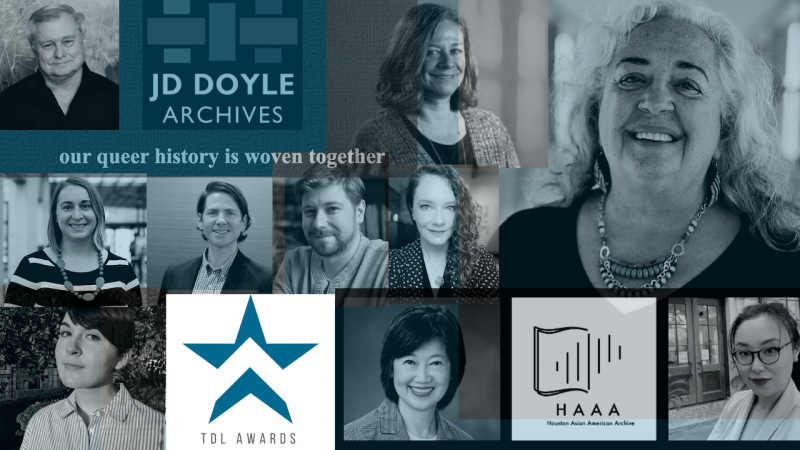 The 2021 awards winners represent a variety of institutions and projects. Archivists, digital scholarship, and open access champions at academic libraries and community archives from around Texas are among this year’s winners, showcasing the cross disciplinary and inter-institutional partnerships that libraries and archives leverage so well.
The 2021 awards winners represent a variety of institutions and projects. Archivists, digital scholarship, and open access champions at academic libraries and community archives from around Texas are among this year’s winners, showcasing the cross disciplinary and inter-institutional partnerships that libraries and archives leverage so well.
Texas Digital Library is proud to present this year’s TDL Award Winners, accompanied by their nominations.
Excellence Award | Trailblazer Award | Outreach Award | Student Excellence Award | Scholarly Communication Award | Individual Impact Award | TDL Service Award | 2021 Awards Committee | Stay Engaged
Excellence Award | Houston Asian American Archive at Rice University
The TDL Excellence Award honors a specific project that demonstrates overall excellence in one or more areas of digital library practice.
The winner of this year’s Excellence Award is the Houston Asian American Archive at Rice University.

Sherry Tseng Hill (b. 1957, Taiwan)
Forgive But Not Forget (2020)
Acrylic on Canvas, 48 x 18 in.
Donated by the artist.
Location: Woodson Research Center, Fondren Library, Rice University.
By Ann Shi, Associate Curator, Houston Asian American Archive
During the year of 2020, COVID pandemic struck the world and many are dealing with anxiety, stress and pain. The Houston Asian American Archive (HAAA) initiated a series of projects to respond to and archive human experiences, and provide a space of communal archive of stories, emotions, and healing, for the Rice community and beyond.
The HAAA is a digital scholarship project managed by Chao Center for Asian Studies, residing in Fondren Library, Rice University in 2010. HAAA is co-founded and managed by Dr. Anne Chao, adjunct faculty at the Department of History and Board of Trustees at Rice University. For over a decade, many scholars and talents have contributed to the success of the archive: Professor Tani Barlow, who helped conceive the project; Amanda Focke, Director of the Special Collection of the Woodson Research Center at the Fondren Library, is the Archivist of HAAA, who has meticulously and patiently catalogued our interviews and donated materials for eleven years; Katherine Shen, a volunteer who ensures that the interns ask the right and in-depth questions. Ann Shi, associate curator, whose vision for the archive to be more than a repository of oral interviews, and who gave color, imagination, and artistic direction to the archive.
In April 2020, the COVID-19 special collection‚ COVID Chronicles, was initiated to collect stories in the Asian American community about their experiences in and actions taken to fight the pandemic and protect others. To honor those who have been exerting themselves with an exceptional work ethic in this unprecedented situation, we have collected the stories of frontline workers, community leaders, volunteers, advocates and many others. We have also compiled interviews into playlists on our social media platform:
Salute Asian American Heroes: a curated collection to honor those who contributed in the health crisis.
COVID Chronicles: a broad-based collection for stories and experiences in the pandemic.
In June, the Racial Justice & Civic Engagement special collection was started to document stories and discussions about Black Lives Matter movement and other racial justice topics, as well as civic engagements on voting rights and its pressing matters before the election. This will be a collection ongoing as well as revisited in every election cycle.
“Dear Houston — Love, Asian America,” was started in February 2021 as an extension of the special collections, which focuses on Asian American’s love stories. It was initially inspired by the love-at-first-sight story of Beck Hong Gee (which was released on https://haaa.rice.edu/podcasts, a Valentine’s Day podcast directed by Ann Shi). Two HAAA interns, Sarah Kong and Helen Pu, both started their own oral history projects, the former on Asian food oral history, the latter on the networks of Chinese Christian Churches, will form upcoming episodes in this podcast.
In addition to oral histories, art has been invited to the Archive to further the mission of HAAA and to embody the voices in oral histories. Two public exhibitions, “Faces in the Pandemic” and “Portal of Healing: Crossing the Bridge Together” were curated by Ann Shi in fall 2020 and spring 2021. Both were community projects with open calls to engage the public, encouraging them to share their stories with the archive. In “Faces in the Pandemic”, portraits of 120 volunteers were mounted onto a narrow hallway in the Fondren Library, whose intense gazes created questions about their identities in diaspora. Ten Asian and Asian American artists made works during and in response to events in the pandemic to give voices to the Asian American community.
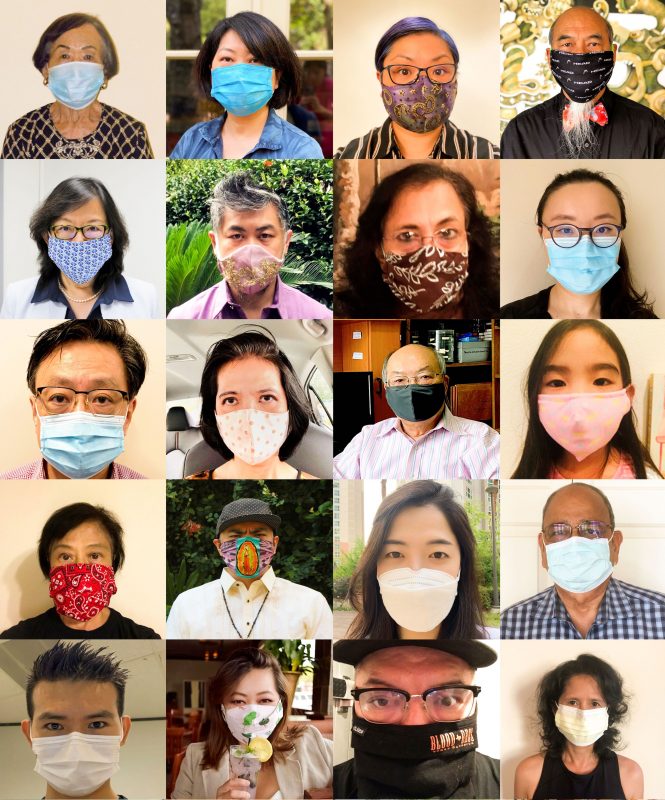
Faces in the Pandemic, 2020
Photo collage in 10 Panels, 48″ x 69″ each.
Courtesy of all 120 Volunteers
In “Portal of Healing: Crossing the Bridge Together”, of which the planning started in October 2020, again, open calls were casted for Asian American community to submit creative writings in the theme of grief, healing, human strife, and condolences. Working with Flipina American gestural painter, Rice Architecture School alumni, Rachel Gonzales, the HAAA interns led by Ann Shi, weaved out quotes from HAAA interviewees along with the open call submissions which included two poetries, one specifically made for the exhibition. Rachel inscribed these words in her calligraphy onto the immersive art installation. A performance on video by Rea Sampilo, manifesting the female body, the vitality of humanity, painted the air as a brush in the space of healing, embodying the experiences of the pandemic told by the voices in the oral history. The exhibition cohesively threaded the SallyPort of Rice campus, the space framed by feminist painter Dorothy Hood’s two ceiling-tall gestural canvases, and the Twilight Epiphany by James Turrell, symboling the endless tunneling of the healing energy into the female body, the female womb, and to the cosmic womb into the universe of the Skyspace. (Exhibition materials can be found here.)
For these contributions, I would consider HAAA worthy of nomination for the Excellence Award, and would appreciate the consideration from Texas Digital Library.
Trailblazer Award | JD Doyle Archives
The Trailblazer Award honors the work of an individual or group within a Texas academic library who has used limited resources in innovative ways to create, maintain or support digital collections.
This year’s winner of the Trailblazer Award is the JD Doyle Archives.
By JD Doyle
The JD Doyle Archives (JDDoyleArchives.org) is a culmination of twenty years of work preserving LGBT history, in three different areas, and totaling over 18,000 web pages of content.
First was Queer Music Heritage, a radio show running from January 2000 until March 2015. It was both a radio show and a website, and the goal of both was to preserve and share the music of our culture. Each month’s page gives the playlist and additional pages of info, and you can stream or download every show. Although the programming has stopped the site will continue as a resource for the history of LGBT music. Over 580 hours of programming are archived. Covering almost every area of music, it documented the presence of LGBT musicians and singers, and their recordings, and this was done not only with monthly shows but visually showing images of the people, the albums, CDs, tapes, even 78 rpm records dating back to the 1920s, so a visual and audio history.
Special focus was always on music that was lyrically gay, telling our stories, documenting our histories, be it coming out, celebrating our pride, or mourning our losses to AIDS, with many theme shows covering different areas. Interviews with many of our musical pioneers were part of the series, some of whom are sadly now deceased. Special attention was shown to Women’s Music and that of Transgender artists. I wish I had had competition, as there is plenty of history to share, but this was the only radio show or website trying to capture and share the history of our music.
Under the QMH umbrellas was a second internet radio show, OutRadio, which satisfied my need to also showcase ‚ recent artists, again with many interviews allowing them to tell of their musical journeys. And also on the site are the episodes of Audiofile. That was a monthly music review segment carried by the radio newsmagazine This Way Out, lasting 14 years, from 1997 through the end of 2010. All segments are archived.
From the start I found my QMH site a place to share the extensive information I have on Female Impersonation, mostly vintage, and including a music discography of those singing drag queens. There is a wide variety, including drag scrapbooks, sheet music, club programs, postcards, and memorabilia. It is itself one of the largest resources on the internet of this area of the culture.
QMH101.com is a special project of my radio show and website Queer Music Heritage. It was designed as sort of a study guide, or lesson plan, and the hope was for it to appeal to those LGBT Studies courses now found at many universities around the country. I recognized that the music history was missing from most courses, and decided to make filling that need possible. A number of professors of those courses have reported back to me of the successful use of that project.
I have always been interested in others queer history areas, but around 2014 I felt the need to close down the (very time intensive) radio efforts in order to devote my energies to two other areas. So next was the website Houston LGBT History, which (still growing) is a resource of mostly Houston history, but also ample areas of Statewide focus, like gay & lesbian publications of Dallas, Austin, San Antonio and other Texas cities. My digital publication efforts have been ambitious, including (just one example) digitizing all 1518 issues of the statewide magazine This Week in Texas (1975-2013), which in a way covered the cultural lifeblood of gay life in the state.
Separate sections of that site cover my Three P’s: Publications, Politics and Pride, and they and others on Bars, Businesses, Organizations, Events, People and more display thousands of clippings from the publications, organized chronologically to enable logical research in many areas of the culture. I have often been told by writers that they could not have done an article on our history that they had published without my site as a resource.
The History site is also host to a project that is both a pop-up museum of Houston LGBT history and an organized website. The Banner Project has a striking visual display that is used annually at the University of Houston and it has been featured at a number of galas and events. It is found at HoustonWeHaveHistory.org, which includes essays on the subject of each banner.
A third large and growing resource is the Texas Obituary Project, a searchable database showing obituaries (from gay publications and a variety of sources) for those LGBT Texans we have lost. Of course a large percent of the almost 7500 obituaries were due to AIDS, but there is no criteria on the cause of death, and entries are coded with tags (AIDS, violence, Black, Latino, female, and now, COVID). So, a researcher could look for the number of AIDS deaths in Dallas in 1993, or chart the deaths due to violence (whether gay-bashing/murder or in a relationship). In 2018 the Houston Chronicle did a front-page article on this website, which also captured the poignant means that it has given many people closure in mourning their loved ones.
In 2019 I was notified that the Library of Congress has selected my websites for inclusion in the materials related to LGBTQ+ studies. I am very honored by this, as it means my work will be preserved long into the future.
I hope by example my work demonstrates to other historians and archives ways to capture, organize and display specific histories. Although not affiliated with the University of Houston, I work closely with representatives of their LGBT Resource Center, and often borrow and digitize publications from their collection, making the files available online generally for the first time. And I make frequent donations of materials to their holdings.
Outreach Award | UT El Paso Institute of Oral History
The Outreach Award honors an individual or team that demonstrates a creative and successful approach to reaching new users and building awareness of an organization’s digital library.
The winner of this year’s Outreach Award is the UT El Paso Institute of Oral History.
By Yolanda Leyva, Associate Professor of History, Department of History, UTEP
I am pleased to nominate The University of Texas at El Paso (UTEP) Institute of Oral History (IOH) for the Texas Digital Library Outreach Award. The IOH is the largest repository of border-related oral histories in the United States. In the past three years, Dr. Meredith E. Abarca (affiliated faculty) and the IOH team created three video projects based on oral histories with the goals of reaching a broader audience and informing people about our digital collection. The videos have reached a wide audience as evidenced by the number of views on our platforms, which include Vimeo, YouTube, and a website dedicated to Dr. Abarca’s project, El Paso Food Voices. Links are below, following this narrative.
The IOH and Special Collections of the UTEP Library have collaborated for decades to make our oral histories accessible through the library. Early on, students and community members visited the Library in person to access transcripts and audio. Beginning in 2009, the Library began to provide access to our collection through a searchable database, first Digital Commons and now Scholar Works. It has been a very fruitful collaboration. Last year, people downloaded our oral histories 22,232 times.
Scholars and students have consulted our collection extensively over the past five decades to write about border history, immigration, Mexican Americans, West Texas, and historical events such as the WWII-era Bracero Program. We are dedicated to expanding our audience to the broader public and K-12 educators and for the past several years we have sought creative ways to makes the stories in our collection accessible to these audiences by creating video projects available online.
This nomination features three digital oral projects: Voices from the Border (2018-2019), El Paso Food Voices (2018- present), and ‚La Frontera Speaks (2020- present). Each project uses oral history as the core element, combining it with contemporary and historic photographs, and writing and narration by scholars.
The oral histories in our collection are wide-ranging thematically and chronologically. The earliest interviews, from the 1960s and 1970s, feature interviewees who were born in the late 19th and early 20th centuries. An older oral history project, Bracero Archive, amassed hundreds of interviews with men who entered the United States as braceros, temporary workers who came to the U.S. in agriculture and various industries beginning in World War II. Our collection contains oral histories that speak about educational history, migration, entrepreneurship, and daily life on the border. Since 2018, El Paso Food Voices has contributed oral histories that focus on the knowledge, practices, and memories about the food of El Paso’s people. These stories reveal a city’s living history, which is made up of diverse populations, a past with roots spreading in multiple directions, and a dynamic and ever-changing present.
The inaugural video for our Voices from the border series focused on education. In July 2016, we conducted oral histories with several people who had attended segregated so-called Mexican schools in El Paso in the 1950s- 1970s. Ranging in age from their 50s to their 80s, they discussed what it was like to attend school at a time when there was widespread discrimination against Mexican American students. The video is available here.The video has over 600 views to date. Two videos featuring oral histories with former braceros followed. In 2016, in preparation for the 75th anniversary of the beginning of the Bracero program in 1942, we began interviewing former braceros, contributing to an already existing collection. The videos draw from both projects. They may be viewed here(1008 views to date) and here (204 views to date).
Another example of a video from the Voices of the Border series is Uncaged Art. While our collection is historical, we also understand that the present is filled with historical issues. In April 2019, the IOH debuted a museum exhibit of artwork by migrant Central American children who had been detained in an emergency influx center under the US Department of Health and Human Services. They were asylum seekers from Central America who had been either separated from their families through the Zero Tolerance policy of the former administration or had crossed the border alone. Our video includes comments by Freddy, (not his real name), a young Honduran who had been detained in the influx center the previous year. It may be viewed here(477 views to date). Another video, Save Duranguito, is based on oral histories with residents and former residents of El Paso’s first neighborhood that is slated for demolition by the City of El Paso. (248 views to date).
In 2020, we inaugurated ‚La Frontera Speaks. Each oral history is attached to two videos. One combines context written by a scholar along with excerpts from the oral history. A second related video highlights the same history while providing additional historical context. We created our first two videos from an oral history with Juan Virgen Diaz, a former bracero who came to the United States as a teenager in 1961. The videos may be viewed here https://vimeo.com/483809466 and here https://vimeo.com/489130798. Currently, we have videos in production featuring an interviewee who worked as a clerk at a Bracero processing center in the early 1950s, telling the little-known story of Mexican American women who worked in the Bracero processing centers. We are also producing videos based on an oral history of a woman talking about the lifelong significance of creosote (an important plant in our desert). The scholar for that video is writing her dissertation on the history of creosote. These videos tell the rich and varied history of people on the border and their relationship to international, national, and local events as well as their everyday lives.
El Paso Food Voices collects food stories from home cooks, professional chefs, restaurant owners, educators, and others to learn about our city’s culinary landscape, its histories, cultures, environments, politics, and economics. Each video is created and produced from an oral history conducted by Meredith E. Abarca. Each video is arranged thematically based on topics gathered from an individual’s story. These have ranged from introducing Mexican ingredients to East Indian cooking, reminiscing about long gone El Paso eateries; being born with a cooking gene; reclaiming ancestral foods. The collection also includes recipes created by El Paso residents that range from Sweet Potato Pie,Hot and Spicy Vegetable Curry, to Nohpalli Fruit Salad. As a collection gathered in a YouTube channel, these videos have 455 views to date. You may view videos here: Parul Haribhai’s The Foodie Gene‚ Roman Wilcox’s ‚ Cooking with Intention and Responsibility.
We are especially proud that these digital projects telling the stories and histories of border people are the work of a collaboration among faculty, doctoral students, MA students, undergraduate students, and staff. One of our videographers and our MA research assistant are funded through the Mellon EPCC-UTEP Humanities Collaborative, creating a relationship between the El Paso Community College and our university. Digital projects have the potential to create greater access to our collection of oral histories, to provide new resources for educators K-12 and higher education, and to encourage people to record their own stories.
Contributors to the digital projects
Dr. Yolanda Chavez Leyva, Department of History
Dr. Meredith Abarca, Department of English
Kimberly Sumano Ortega, doctoral candidate, Department of History
Ligia Arguilez, doctoral candidate, Department of History
Luis Garcia, MA student, Department of English
Juan Jose Vargas, undergraduate student, Department of Communications
Solomon Contreras, undergraduate student, El Paso Community College
Vianey Alejandra Zavala, manager, Institute of Oral History
Denise Amparan, administrative assistant, Institute of Oral History
Links
UTEP Institute of Oral History Vimeo
UTEP El Paso Food Voices website
Student Excellence Award | Glory Turnbull, St. Mary’s University
The Student Excellence Award honors an individual undergraduate or graduate student that demonstrates overall excellence and contributions to digital library practice.
This year’s Student Excellence Award winner is Glory Turnbull.
By Lindsey Wieck, Assistant Professor and Director of Public History, St. Mary’s University
Glory Turnbull (they/them), a combined degree student in Public History (pursuing undergraduate and graduate degrees simultaneously, has been a key member of our project team in the Old Spanish Trail (OST) digitization project since August 2019. During that time, Glory has contributed to a three-student team who have scanned and produced metadata for the nearly 2000 items in the collection. Over and above these responsibilities, Glory helped smooth out our workflow, trained additional undergraduates to produce metadata, and developed a physical and digital version of an exhibit that used these materials. They are currently working to add projects created by undergraduate and graduate students to the archive website to preserve and share this work with others.
This project digitized the Old Spanish Trail (OST) collection, held by the Blume Library at St. Mary’s University [StMU], for the Old Spanish Trail’s centennial celebrations (2015-2029). The digitization of these resources will enable the integration of these primary sources in classrooms and support scholarly research throughout the nation. The collection is significant not only to the history of San Antonio, but also to the entire region, because it linked cities from St. Augustine, Florida to San Diego, California. The OST was built in the 1910s and 1920s as an automobile route. A major waypoint in this coast-to-coast route was San Antonio, Texas where the Old Spanish Trail Association headquarters were located. The association promoted the development of an auto highway throughout the South. The highway encouraged commerce, economic development and social connections among former Spanish colonies that have, to this day, a substantial Hispanic population. The OST had a major impact on the region, including on the development of tourism, highway development, and the built environment of the South.
Digital Archive: Glory played a key role in digitizing the materials and preparing them for upload online. The metadata Glory produced was consistent, clear, and useful. With Glory’s hard work, we were able to successfully scan and organize 100% of the materials in this archival collection. We have currently completed metadata on more than 95% of the items in this collection. We launched the digital archive at https://omeka.stmarytx.edu/ost.
Digital and Physical Exhibit: Glory produced a traveling exhibit that will engage the public in cities along the OST from Florida to California in partnership with the Old Spanish Trail 100 [OST 100], an organization formed in 2004 to recognize and celebrate the 100th anniversary of the OST. Glory also produced a digital version of the exhibit to ensure that it’s accessible to all, wherever they are in the world. As part of the research for this exhibit, Glory contacted experts on the OST and its history to find images, clarify questions, and do additional research. In this work, Glory addressed tough questions including the following: Who was the targeted audience of the OST’s boosterism? Who benefitted from this increase of travelers? What were the racial implications of invoking a romanticized vision of the Spanish past? How were these racial ideas inscribed into the landscape of the OST? In these final products, they tackled tough questions like these while also thoughtfully discussing these topics so as not to isolate OST enthusiasts. Notably, Glory persisted in producing this project throughout the challenges COVID-19 presented to them and to other students. The digital exhibit can be found here: https://omeka.stmarytx.edu/omeka-s/s/ost/page/exhibit-landing. A copy of the physical exhibit is in the attachments section.
Further Related Work: Approximately 100 undergraduate and graduate students in Dr. Teresa Van Hoy’s courses this fall produced mini-research projects using OST materials digitized in this project. Glory produced an OST timeline for one of these courses. Glory is currently working to build a student project showcase that will make all of these projects accessible to researchers, OST enthusiasts, and students throughout the U.S. and beyond.
Career Goals: Glory noted that this project helped them achieve marketable skills in archiving and digitization that moves them toward long-term career goals: These skills put me ahead of my undergraduate peers, and this project is the primary reason I was able to land a Collections internship [last] summer. I learned how to work with and train other students, and I’ve even taken a tentative step into curation and exhibit text writing. Glory has used this project to develop valuable skills and projects for their portfolio, taking advantage of all of the opportunities available to learn, grow, and contribute to this project. Currently finishing an M.A. in Public History (Spring 2021 graduation), Glory is sure to continue to use these skills in their next steps as a student of archives and records management beginning Fall 2021. They hope to become an archivist or museum professional in the future.
Overall, Glory has been an essential member of this project team, taking on responsibilities beyond their peers. Glory’s work ethic, attention to detail, and contextualization skills have ensured this project has had a successful result. Without Glory’s contributions, this project would lack much of the rich context infused throughout the archive and exhibit.
Scholarly Communication Award | Taylor Davis-Van Atta, University of Houston Libraries
The Scholarly Communications Award honors the work of an individual or group of academics, including faculty and librarians, who have made significant advances in our understanding of the issues surrounding scholarly communications.
This year’s recipient of the Scholarly Communications Award is Taylor Davis-Van Atta, Director of the Digital Research Commons at University of Houston Libraries.
By Anne Washington, University of Houston Libraries
Taylor Davis Van Atta is most deserving of the TDL Scholarly Communication Award for his leadership in transforming UH Libraries scholarly communication services and support. His achievements include significantly growing University of Houston (UH)‚ open access repositories; championing UH Libraries services across campus; and creatively engaging UH colleges and programs to make thousands of student and faculty works openly available.
Taylor joined the University of Houston Libraries in 2017 as the Digital Scholarship Coordinator and in 2020, was promoted to the Director of the Director of the Digital Research Commons. In his roles, he has been, and remains, a driving force behind expanding scholarly communication services for UH faculty and students.
Two of Taylor’s earliest initiatives laid the foundation for expanded services at the libraries: 1) Building out the necessary infrastructure, the Cougar ROAR (Repositories for Open Access), to support scholars in depositing and sharing their open works, and 2) Establishing a CV service at the libraries as a mediate way to deposit faculty works into the IR.
-Cougar ROAR
While UH Libraries used TDL-hosted DSpace as its IR since about 2013, it contained only Electronic Theses and Dissertations. After some initial exploration into the expansion of the IR to include other works, Taylor, as part of the Cougar ROAR project, further established infrastructure for supporting open scholarship and invited in early campus partners. By the end of the project, the Cougar ROAR team had: 1. Established a single page launchpad to our Dataverse repository and our DSpace institutional repository
(https://guides.lib.uh.edu/roar), 2. Created policies and guides for these repositories, 3. Compiled feedback from faculty on these services and materials, 4. Created marketing materials for our services, 5. Started early conversations with UH colleges and departments about scholarly communication services, and 6. Created a roadmap for future open access initiatives.
-Establishing a CV Service
Learning from focus groups with faculty, current literature, and from colleagues in the field, Taylor found that the most likely way we would increase the amount of content in the IR is to follow a mediated submission model. What he brought to life is a service for interested faculty to submit their CV to Libraries staff, who would then locate and upload acceptable versions of the articles to the IR: Assisted Institutional Repository Submissions (https://libraries.uh.edu/research/ir-assist/). He worked in close collaboration with the metadata team to develop sustainable processes to support this service, which is now mainly staffed by student employees. Through this services, we’ve added hundreds of open access articles, posters, presentations, and more.
Taylor built off of the momentum of these initiatives, deepening his relationships with faculty tapped for earlier adoption and forging new relationships with UH programs, departments, and colleges. Taylor championed the use of the IR for a wider breadth of materials including audio/video from UH programs, student research events, and other capstone projects. Because of Taylor’s outreach, we now regularly add hundreds of works to the IR from different programs and events including: the College of Nursing Spring Forum, Undergraduate Research Day posters, Senior Honors Theses, and the Moores School of Music recital recordings (see the full list here in the UH Faculty, Staff, and Student Works collection: https://uh ir.tdl.org/handle/10657/21). The impact of this work cannot be overstated; he was instrumental in centering the IR as a platform for open access works at UH.
Taylor continues to champion Open Access at UH through his ongoing outreach to UH departments and colleges; collaboration with Ariana Santiago, UH Libraries‚ Open Educational Resources Coordinator; and his leadership in Digital Research Services as the Director of the Digital Research Commons. He advocates for fair licensing agreements and for practices that make data and research products openly available and reusable.
These achievements are impressive, of course, but it’s so critical that we also recognize our colleagues that make our working lives better, and Taylor is one of those people. He is a thoughtful collaborator, an advocate for his teams, and what I appreciate most is how he empowers his colleagues and every member of his project
teams. He has supreme confidence in his students and colleagues, which drives creativity and leads to impressive results. Taylor finds ways to bring people into collaborative work and makes it easy for everyone to shine in their strengths. He creates opportunities for staff and students to drive process improvements and is always sure to acknowledge their contributions. Not only does Taylor share his expertise and collaborative spirit with UH, he is actively involved in organizations such as TDL and ACRL. I cannot think of a more deserving individual for the TDL Scholarly Communication Award.
Individual Impact Award | Julianna Barrera-Gomez
The Individual Impact Award honors an individual who has made significant contributions and improvements related to the field of digital curation and digital scholarship. Nominees demonstrated their impact by fostering the development of students and early career professionals, facilitating communities, building infrastructure, and/or contributing to scholarship.
This year’s Individual Impact winner is Julianna Barrera-Gomez, Digital Archivist at University of Texas at San Antonio.
By Amy Rushing, Assistant Dean for Special Collections,University of Texas at San Antonio Libraries Special Collections
Through openness, approachability, enthusiasm for collaboration, and willingness to share her valuable knowledge and expertise, Julianna has made a positive impact on the digital curation community, particularly in Texas.
As a member of the TDL Texas Archivematica Users Group (A-TEX) Steering Committee, Julianna plays an influential role in leading digital preservation efforts, decisions, and practices at UTSA and throughout Texas. She has played a key role in helping plan in-person meetings and networking events, answering questions, and contributing her expertise through panels and webinars. She has a distinctive situation and unique experiences to share with the TDL community, particularly in the area of digital preservation. As the only longstanding administrator of the ArchivesDirect digital preservation platform in Texas, Julianna’s knowledge and expertise have both informed and influenced the A-TEX steering committee’s efforts in serving the Archivematica community around the state. She has presented on her work numerous times in different venues which has impacted many local preservation decisions within the community.
At UTSA, Julianna spearheaded the formation of the Libraries Digital Stewardship Governance Group. Governance Group members are mainly non-archivists from every area in the Libraries who have a role in creating or managing digital content. Julianna’s leadership is helping the Libraries build a collective knowledge of the challenges and considerations in digital preservation so that this knowledge doesn’t just reside in Special Collections. She presents digital preservation concepts in an accessible way and provides real-world, relatable examples that are easily digestible by colleagues who do not work in the digital curation field.
Through her service, Julianna makes significant contributions in building a sense of unity and purpose. She is an advocate for smaller institutions that are often operating with restricted resources like small staff sizes, a lack of specialized expertise, inadequate technical infrastructures, and/or limited budgets.
She is currently co-chair of the Texas Archival Resources Online (TARO) Standards Committee. Julianna exhaustively researched metadata standards to empower software developers, as well as other TARO committees, to capitalize on the new website’s ability to make finding aids even more discoverable. This led to detailed revisions of TARO’s EAD Best Practice Guide. She also helped lead the charge on laying groundwork for TARO’s conversion to EAD3.
TDL Service Award | Colleen Lyon, Dianna Morganti, John Watts, and Jessica Trelogan
The TDL Service Award is given at the discretion of the Texas Digital Library to an individual or group at a member institution who do exceptional work in the service of the Texas Digital Library consortium.
This year we are pleased to recognize Colleen Lyon, Dianna Morganti, John Watts, and Jessica Trelogan.
By Courtney Mumma
Each year, the Texas Digital Library honors a winner from among our TDL members (an individual or a group) who have made outstanding and meaningful contributions to the TDL consortium and its members. The 2021 recipient of the 2021 Texas Digital Library Service Award, the Carpentries Pilot Project Team. They are Dianna Morganti at Texas State University, Colleen Lyon and Jessica Trelogan at UT Austin, and John Watts at Texas A&M University.Their collaborative work on the foundation, management, and assessment of the TDL Carpentries pilot has been exemplary. Training Carpentries instructors from among our TDL member institutions will serve to expand data expertise across Texas and the region. TDL is grateful for your efforts in leading this project from start to finish – from proposing the Carpentries pilot to TDL’s Governing Board and coordinating the launch and equitable selection of trainees, to building a community of instructors, hosting and organizing several workshops, and laying the groundwork for continued Carpentries engagement in Texas.Congratulations Colleen, Dianna, Jessica and John, for your service to TDL!
We would also like to recognize our nominees for the 2021 TDL Awards
- COVID-19: The Hilltop Perspective, St. Edwards University
- C.L. Sonnichsen Special Collections Department, The University of Texas at El Paso Library/Fanny Zlabovsky – National Council of Jewish Women Case Files Digitization Project
- William J. Hill Texas Artisans and Artists Archive
- Archiving for the Future: An Open Educational Resource
- University of North Texas Digital Libraries’ Digital Newspaper Unit
- Voices of SMU Oral History Collection
- Darryl Stuhr, Director of Digitization and Digital Preservation, Baylor University Libraries
- Darryl Tocker, The Tocker Foundation
- Annie Wu,Head, Metadata and Digitization Services, University Libraries, University of Houston
- Cushing Library / Bryan + College Station Public Library System Summer Reading Program digital scavenger hunt
- Stephen Sloan, Waco History App
- Constitutions of Texas, 1824-1876, Tarlton Law Library
- Scholarly Impact Service, University of North Texas Libraries
- Emily Vinson, University of Houston Libraries Special Collections
- Austin Museum of Popular Culture Digital Retooling
2020 TDL Award Winners
The 2020 awards winners represent a variety of institutions and projects. Archivists, digital scholarship, and open access champions at academic libraries and community archives from around Texas are among this year’s winners, showcasing the cross disciplinary and inter-institutional partnerships that libraries and archives leverage so well.
Texas Digital Library is proud to present this year’s TDL Award Winners, accompanied by their nominations.
Excellence Award | Trailblazer Award | Outreach Award | Student Excellence Award | Scholarly Communication Award | Individual Impact Award | TDL Service Award | 2020 Awards Committee | Stay Engaged
Excellence Award | LGBTQ Archive at UNT
The TDL Excellence Award honors a specific project that demonstrates overall excellence in one or more areas of digital library practice.
The winner of this year’s Excellence Award is the University of North Texas LGBTQ Archive.
Project Team Members:
- Morgan Gieringer, Head of Special Collections, UNT Libraries
- Jaimi Parker, Exhibits Coordinator, UNT Libraries
By Robert Emery, Community Advocate for The Dallas Way, and 2019 Outreach Award winner
Jaimi Parker and Morgan Gieringer co-authored an article that was recently published in the Journal of Archival Organization, titled “Collection and Digitization of Artifacts in the University of 4.” It proves their excellence in digitization.
Their LGBTQ Archive is one of the most requested resources in Special Collections, and has been used by students, scholars, filmmakers, and journalists across the country. Unlike many of UNT’s collections, the LGBTQ Archive also contains a large number of artifacts. As part of a community-built archive, artifacts within LGBTQ collections have a particularly personal significance. Artifacts also have potent emotional significance as symbols of activism and public displays of identity.
The need to create digital representations of these unique and important materials cannot be overlooked. New workflows for the capture and description of this digital content have been created. The archive contains some collections made up entirely of t-shirts or buttons, while most collections contain a mix of wearable or displayable artifacts mixed in with more typical archival documents and photographs. These two women share “best practices” with their readers, in regard to creating digital surrogates, proving their excellence in this emerging area of historical archiving. Since artifacts play such an essential role in archives, it is important to develop standards for their digital representation and digital preservation.
As Morgan and Jaimi have ventured into this new area with relatively few standards in place across the profession. They have made clear that standards need to be set to ensure process continuity and that all important information about the artifacts is captured both in the digital surrogates and in the associated metadata.
Trailblazer Award | San Antonio African American Community Archive and Museum
The Trailblazer Award honors the work of an individual or group within a Texas academic library who has used limited resources in innovative ways to create, maintain or support digital collections.
This year’s winner of the Trailblazer Award is the San Antonio African American Community Archive and Museum (SAAACAM).
By Chaitra Powell, African American Collections and Outreach Archivist, University of North Carolina, Chapel Hill
I encountered the loose assortment of artists, librarians, historians, and community members that would become SAAACAM for the first time at the AT&T Arena in October of 2016. The Kronkosky Foundation along with the Spurs organization hosted us as cultural heritage practitioners in a day long conversation about the need for African American community-based archives in the city of San Antonio. I will never forget the audacity of that group, situated in a city full of world class museums and universities, deciding that they could protect and tell their story better than anyone else and they would become a destination for anyone wanting to understand the story of African Americans in San Antonio.
In the four years that I have been associated with SAAACAM, I can see them making successful moves in so many different directions. They are engaging San Antonio’s African American community through a series of oral history collecting and community scan (history harvest) events. They are building their own workforce as they train volunteers to conduct these events and draw on the unique strengths of community members through a broad slate of committees (finance, research, programming, etc.) managed by the SAAACAM board of directors. They are engaging general audiences with their participation in citywide events like Dia de Los Muertos, Fiesta, and Juneteenth programs and membership with San Antonio’s tourism bureau — including revisions to the script of the wildly popular Go Rio river tours in downtown San Antonio .
They are engaging the next generation of K-12 students and college level scholars. Their work on K-12 African American Studies curriculum development is slated to be approved in April 2020 and implemented throughout the state of Texas in the Fall semester. They’ve partnered with faculty and students at Texas A&M at San Antonio to produce original research and digital projects on Black placemaking, the legacy of the Sutton Family, and the Black ranching families that made contributions to the city’s economy and culture. They’ve made inroads with historic preservation groups in San Antonio with their research and advocacy around historically African American burial sites and the Woolworth’s Building in the Alamo Plaza.
SAAACAM’s strategic partnerships, fundraising, and allocation of resources has reached a new milestone as they’ve secured enough funds to hire a museum director, program manager, and accountant! SAAACAM is doing this high impact work with in community with a vision for a 21st century, mostly born digital, museum and archive at its center. Organizations like SAAACAM are vital to field of librarianship. They are not just talking about it, they are actually showing us how to be an archive that values racial, class, and socioeconomic diversity, encourages a plurality of voices from history, and being responsive to the needs of its community. Their collaborations with UNC-Chapel Hill and Texas A&M at San Antonio are groundbreaking in the amount of curiosity and deference they have for the role of an institutional repository and at the same time the autonomy and control over their collections that their enterprise requires. They are learning about the value of curation, description, preservation and making decisions that will ensure the long time use and viability of their materials.
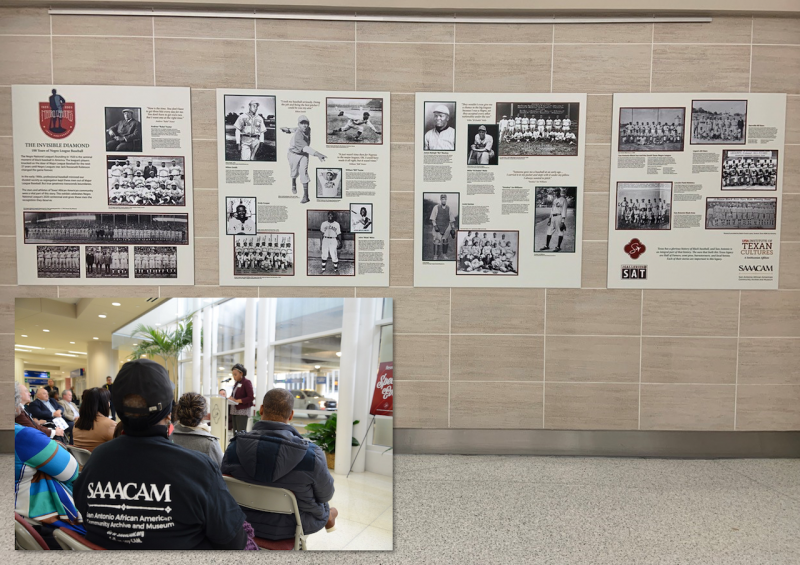
Opening of first exhibits at San Antonio International Airport – 1000 Faces, Portraits in Gold, Cattle Brands
The SAAACAM organization is trailblazing because they are successfully pulling together the threads of San Antonio’s African American community to imagine a new future. They are standing in the face of gentrification and erasure and using the voices of their ancestors to present an alternative. They are a model for community archives and it has been our honor to collaborate with them on our Community Driven Archives program.
Outreach Award | Texas Film Round-Up
The Outreach Award honors an individual or team that demonstrates a creative and successful approach to reaching new users and building awareness of an organization’s digital library.
The winner of this year’s Outreach Award is the Texas Film Round-Up at the Texas Archive of the Moving Image.
By Elizabeth Hansen, interim Director, Texas Archive of the Moving Image
The Texas Film Round-Up is a ground-breaking public service initiative to discover, preserve, digitize and disseminate moving images of Texas. It is a collaboration between the Texas Archive of the Moving Image (TAMI) and the Office of the Governor’s Texas Film Commission (TFC). The program has four components – the free digitization of Texas-related film and video, the growth of a streaming video library, a film “round-up” tour raising public awareness across the state, and an educational curriculum for use in K-12 classrooms. The program started in September of 2008. The program was awarded the American Association for State and Local History’s highest honor, the Wow Award, in 2010.
The cornerstone of the Film Round-Up program is the free digitization of any Texas-related film or video whose owners are willing and able to contribute a digital copy of the material to the TAMI online library. Although this can include feature films, the main focus of the program is “orphan” film materials like home movies, newsreels, educational films, training videos, locally-produced film and television, advertisements and other. Originals are returned to the owners along with information on how to best store the materials as well as digital files. The program is open to both institutions and individuals. As of February 2020, the organization has digitized more than 38,000 films and videos.
In order to promote the free digitization service, TAMI organizes events in several cities throughout the state called the Texas Film Round-Up. At these programs, people can drop off films for the digitization program and view archival moving images from the TAMI collection. The Round-Up has traveled to more than 40 Texas cities to collect materials for the program representing the diversity of the state.
After digitization, a selection of films from the Round-Up are researched and cataloged, and become a part of the TAMI video library. The online library is accessible to the public and easy to browse. It is used by multiple constituents — everyone from Texas students to people around the world interested in the State’s history. More than 3,600 films from the Round-Up are now available through the website: texasarchive.org. The organization encourages viewing and use of the materials through curated exhibits and an active social media presence.
To encourage the educational use of these films, TAMI launched a Teacher Resource section of its website in August of 2009 including lesson plans, activities, directed searches, and tips on use archival footage in the classroom. Lesson plans use the TAMI collection to teach relevant Texas Essential Knowledge and Skills (TEKS) for social studies and media literacy in grades K through 12.
Student Excellence Award | ATX Barrio Archive
The Student Excellence Award honors an individual undergraduate or graduate student that demonstrates overall excellence and contributions to digital library practice.
This year’s Student Excellence Award winner is Alan Garcia, creator of the ATX Barrio Archive.
By Alexandria Suarez, Texas Digital Library
I strongly believe that the ATX Barrio Archive is an exemplary digital archive that focuses on community outreach. This project is led by Alan Garcia, my former classmate and fellow student at UT Austin’s School of Information, who researches and digitizes these stories and who also interviews community members to share their stories.
In a city like Austin, that is constantly trying to erase and gentrify people of color and their communities, archives are critical to keeping stories alive.
The barrio archive digitizes images from local archives and libraries, community members, businesses, and families and brings them all together on Instagram. With over 500 posts, and over 5,500 followers, the archive reaches those who are not only in the Latinx/African American community, but perhaps more importantly, those who are outside of it.
It is the mission of the archive to demonstrate to the marginalized communities in Austin that their voice not only exists, but deserves to be heard. The archive also demonstrates how important it so for policy makers and those unfamiliar with the rich history of these communities to see the value in recognizing the people and places that have made Austin the city it is today. 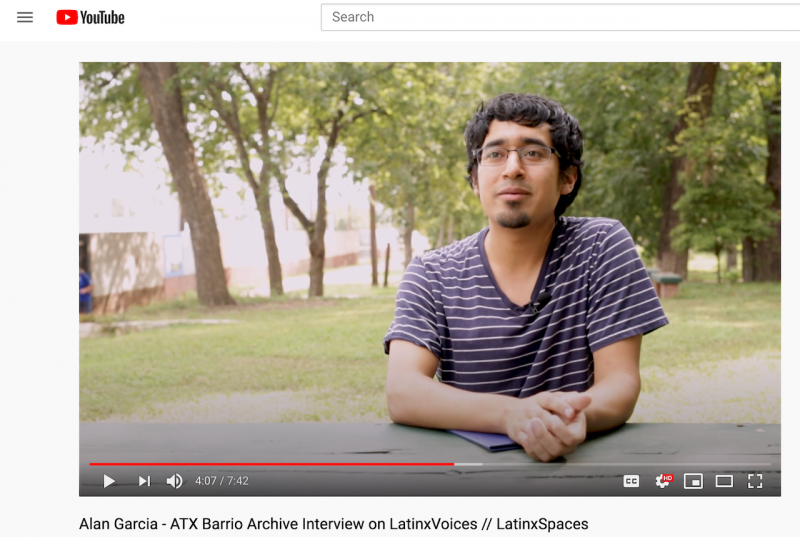
Watch this interview with Alan about the archive.
Scholarly Communications Award | Dr. Deidre Rios
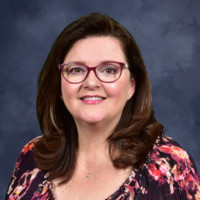
Dr. Deidre (DeDe) Rios, Director of Optometric & Clinical Library Services at the University of Incarnate Word
The Scholarly Communications Award honors the work of an individual or group of academics, including faculty and librarians, who have made significant advances in our understanding of the issues surrounding scholarly communications.
This year’s recipient of the Scholarly Communications Award is Dr. Deidre (Dede) Rios, Director of Optometric & Clinical Library Services at the University of Incarnate Word.
By Tracey Mendoza, Dean of Libraries, University of the Incarnate Word
The Optometric Clinical Practice (ISSN 2575-7717) is a new, open access, peer-reviewed journal devoted to optometric clinical practice that was launched to serve the needs of clinicians and to fill a gap in optometric literature that serves a community of practitioners, researchers, students, an in turn, their patients. The intent was to establish this publication as an open access journal that in the words of UIW Provost, Dr. Barbara Aranda-Naranjo, “allows an instantaneous international readership and furthers the field with evidence-based science”. Dr. Timothy Wingert, Dean of the UIW Rosenberg School of Optometry, supported the creation of this open access publication as it was derived from RSO’s clinical program mission of providing exemplary vision care locally and globally.
I nominate Dr. Rios for this award because this journal would have had difficulty getting off the ground without the hard work and consistent pressure applied by Dr. Rios as the associate editor of the publication. From the outset, Dr. Rios researched the possibilities and merits of an open access, peer-reviewed publication with the Deans of the Rosenberg School of Optometry and UIW Libraries beginning in early 2017. She demonstrated the benefits not only to the UIW community but to a global audience interested in literature of this discipline. In total, Dr. Rios estimates that she has spent 200 hours getting the journal to its publication in October 2019. Not bad for the timeframe and for a day job that isn’t associate editor.
As part of her work, Dr. Rios serves as the liaison between the UIW Libraries Athenaeum and the Rosenberg School of Optometry. To get the journal on its feet, Dr. Rios filed for the ISSN, formatted and submitted the application for the journal, updated the website, set-up training for editors and reviewers, helped to determine if manuscripts need revisions, created the masthead, designed the promotional materials, worked with SPARC and other Library Publishing Forum members to improve online journal publications, and she continues to review and format each article as well as track readership. Because Optometric Clinical Practice is a new, open access journal, Dr. Rios informs other vision science faculty and librarians about the publication. She will continue to serve as an associate editor and is working to make it easier for interested contributors by creating a template for the author’s agreement. She is now working with CrossRef to have DOI’s assigned to each article as well as assigning and uploading metadata and she will pursue getting the journal included and indexed in the Directory of Open Access Journals and given time, PubMed.
Because Dr. Rios is a strong advocate for open access, this important journal is available to fill a scholarly niche that was vacant. Dr. Rios has set an excellent example for the UIW community in how such works are possible to support and still meet a standard of excellence. I see her continuing on a path of supporting scholarly dissemination of information that is equitable and diverse as she pursues professional development opportunities in this area.
This publication is part of the BePress Health and Physical Education Commons, Optometry Commons, Other Education Commons, Other Medicine and Health Sciences Commons, and the Other Public Health Commons.
Individual Impact Award | Anne Washington
The Individual Impact Award honors an individual who has made significant contributions and improvements related to the field of digital curation and digital scholarship. Nominees demonstrated their impact by fostering the development of students and early career professionals, facilitating communities, building infrastructure, and/or contributing to scholarship.
This year’s Individual Impact winner is Anne Washington, Coordinator of Metadata Services at the University of Houston Libraries.
By Annie Wu, Head of Metadata and Digitization Services, University of Houston
It is my great pleasure to nominate Anne Washington, Metadata Services Coordinator at the University of Houston (UH) Libraries, for the 2020 TDL Individual Impact Award. Anne has made significant contributions in digital and metadata field and has displayed high impact by facilitating communities, building infrastructure and contributing to scholarship and profession.
Anne has demonstrated outstanding leadership via active services in library organizations at the national and regional levels. She has served as the co-chair for the ALCTS/LITA Linked Library Data Interest Group, Vice-chair/Chair-elect of the ALCTS Metadata Interest Group, Programming co-chair for the ALCTS Metadata Interest Group, committee member and organizer of Linked Open Data in Libraries Archives and Museums (LODLAM) Summit and DLF Forum Program Committee member. Anne also served in TDL DPLA Metadata working Group and National Information Standards Organization (NISO) working group.
Anne’s leadership in facilitating community has been demonstrated in her service and activities in the South Central States Fedora Users Group (SCSFUG). As past-chair and co-chair of the group, Anne has collaborated with TDL colleagues and regional institutions in organizing, planning, setting the programming agenda and logistics for the group. The SCSFUG meetings have provided much needed opportunity for discussion, collaboration, and networking around relatively new technology in use of Fedora, Samvera and Islandora and other related digital systems/tools. Her contributions has made it possible for a community of practice around Fedora to emerge in the TDL space, making all of us better practitioners and improving our competencies in these emerging areas of repository development and management.
Anne has made significant contributions to innovative projects of national level impact. She is a key member of the Bridge2Hyku project team, which was awarded a $250,000 grant from the Institute of Museum and Library Services (IMLS) to develop a migration toolkit to assist institutions in adopting the open-source Hyku digital repository. She has led the collaborative effort to assess and analyze the project partners’ digital collections data. She has also developed and documented guidelines and strategies for digital collections migration, which is critically important for institutions to successfully migrate their content.
At UH Libraries, Anne has made vital contributions to the Bayou City DAMS (BCDAMS) implementation project, helping the team to establish the libraries next generation digital system’s infrastructure. She has shown courage and capability to assume the leadership of the project, coordinating activities in development of the MVP of our next generation DAMS, facilitating the work of the BCDAMS Data Migration Working Group, standardizing legacy metadata, populating UH Libraries’ Cedar linked data vocabularies and designing metadata application profile. Anne’s significant contributions has helped to advance the strategic goals and mission of UH Libraries.
Anne has shown great enthusiasm in conducting research and has made outstanding contributions to scholarship in digital, metadata and linked data initiatives. Anne has actively presented her research and best practices in high profile venues such as the ALA Annual conference, the Digital Library Federation Forum, the Dublin Core Metadata Initiative annual meeting and Digital Initiative Symposium. Over the last four years, Anne has offered over twenty presentations, workshops, and webinars at national and international level conferences and meetings. Additionally, Anne continues to grow her record of scholarly work, authoring and contributing to numerous peer reviewed articles published in journals such as ALCTS Library Resources & Technical Services, Journal of Library Metadata, Code4Lib. Her co-authored monograph, “Linked Data for the Perplexed Librarian,” is was published in March, 2020.
Anne Washington has shown excellence in promoting common and best practices across the profession, advancing community open source initiatives and fostering research in digital and metadata field. Her significant effort and contributions in digital and metadata field make her well-qualified candidate for the TDL Individual Impact Award.
TDL 2020 Service Award | Christopher Starcher
The TDL Service Award is given at the discretion of the Texas Digital Library to an individual or group at a member institution who do exceptional work in the service of the Texas Digital Library consortium.
This year we are pleased to recognize Chris Starcher from Texas Tech University.
By Courtney Mumma, Deputy Director of Texas Digital Library
For the past few years, I’ve had the privilege to work alongside Chris in the Vireo Open Source Community as a contributing developer and active member of the Vireo User Group’s Steering Committee. Chris, TDL recognizes you with this award for your significant contributions over several years to the Vireo Steering Committee and open source community at large.
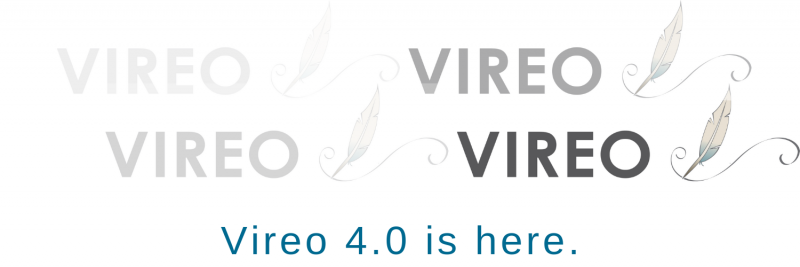
TDL and the Vireo community have benefitted so much from not only your code contributions and participation in development, but also your calm, steady, and consistent leadership on the VUG Steering Committee. You are a wonderful colleague, and you always act with the community in mind. Your recent enlistment of a colleague to get involved in Vireo 4 bug-fixing is further evidence of that, and we know you’ll serve as product owner, a role you recently stepped into on behalf of the Steering committee, with gusto. We really could not have reached a Vireo 4 release without you, and we are enriched as a consortium by your enthusiasm for collective progress and open source infrastructure.
Congratulations, Chris, for your service to TDL!
Stay Engaged
Inspired by these award-winning projects? Nominate yourself, your colleagues, or an organization for a TDL Award. Nominations for 2020 will open in Fall 2019.
Meanwhile, stay engaged with this year’s award-winning organizations and partners on social media.
| TEXAS DIGITAL LIBRARY | |||
| Twitter: @TXDigLibrary
Facebook: @texasdigitallibrary |
|||
| 2020 EXCELLENCE AWARD WINNER | |||
| LGBTQ Archive
University of North Texas Libraries Facebook: @unt.libraries Twitter: @UNT_Libraries Instagram: @unt_libraries |
|||
| 2020 TRAILBLAZER AWARD WINNER | |||
| San Antonio African American Community Archive and Museum
Facebook: @SAAACAM Twitter: @archivemuseum |
|||
| 2020 OUTREACH AWARD WINNER | |||
| Texas Film Round-Up
Texas Archive of the Moving Image Facebook: @texasarchive Twitter: @texasarchive Instagram: @texasarchive |
|||
| 2020 STUDENT EXCELLENCE AWARD WINNER | |||
| Alan Garcia | |||
| 2020 INDIVIDUAL IMPACT AWARD WINNER | |||
| Anne Washington
University of Houston Libraries Facebook: @uhlibraries Twitter: @UHoustonLib |
|||
| 2020 SCHOLARLY COMMUNICATIONS AWARD WINNER | |||
| Dr. Deidre (DeDe) Rios
University of the Incarnate Word Facebook: @UIWLibrary Twitter: @UIWLibrary Instagram: @uiwlibrary |
|||
| 2020 TDL SERVICE AWARD WINNER | |||
| Christopher Starcher
Facebook: @TexasTechLib Twitter: @TexasTechLib Instagram: @texastechlib |
2019 TDL Award Winners
Excellence Award | The 3Dhotbed Project
Project Team Members: Courtney Jacobs, Head of Outreach and Community Engagement, University of California – Los Angeles; Marcia McIntosh, Digital Production Librarian, University of North Texas; Kevin O’Sullivan, Curator of Rare Books and Manuscripts, Texas A&M University
Trailblazer Award | aems emswiler, Archival Fellow with the Inside Books Project
Outreach Award | The Dallas Way
Project Team Members: Robert Emery, Founding member, The Dallas Way; De’An Roper, President, The Dallas Way; Nino Testa, Associate Director, Women & Gender Studies, Texas Christian University
Student Excellence Award | Elizabeth Irvin-Stravoski, University of Houston
Scholarly Communication Award | DeeAnn Ivie, UT San Antonio
Individual Impact | Bethany Scott, University of Houston Libraries
TDL 2019 Service Award | James Creel, Texas A&M Libraries
Stay Engaged
Inspired by these award-winning projects? Nominate yourself, your colleagues, or an organization for a TDL Award. Nominations for 2020 will open in Fall 2019.
Meanwhile, stay engaged with this year’s award-winning organizations and partners on social media.
| The Dallas Way
Instagram @thedallasway Facebook @TheDallasWay |
The Inside Books Project
https://insidebooksproject.org/ Twitter @InsideBooksATX Facebook @insidebooksproject |
| Texas A&M University Libraries
Twitter @tamulibraries Facebook @tamulibraries |
Texas After Violence Project
https://texasafterviolence.org/ Twitter @txafterviolence Facebook @TexasAfterViolenceProject |
| Texas Digital Library
Twitter @TXDigLibrary Facebook @texasdigitallibrary |
3Dhotbed
Instagram @3dhotbed Twitter @3Dhotbed |
| University of California – Los Angeles
Twitter @UCLA_Library Facebook @uclalibrary |
University of Houston Libraries
Twitter @UHoustonLib Facebook @uhlibraries |
| University of North Texas
Twitter @UNT_Libraries Facebook @unt.libraries |
University of Texas at San Antonio Libraries
Twitter @utsalibraries Facebook @utsalibraries |
2018 TDL Award Winners
Excellence in Digital Libraries Award: Project Team: Black Gospel Music Restoration Project, Baylor University
- Project Team Members:
- Eric Ames, Assistant Director, Marketing and Communications
- Stephen Bolech, Audiovisual Digitization Specialist
- Kara Long, Metadata Librarian
- Darryl Stuhr, Associate Director for Digital Projects
- Travis Taylor, Digitization Assistant
Trailblazer Award: Bobby Marlin and the Keiller Drawings project at the Moody Medical Library of the University of Texas Medical Branch at Galveston
Innovative Outreach Award: Jessica Trelogan, for her work on Texas Data Repository outreach
Graduate Student Excellence Award in Digital Libraries: Alicia Niwagaba, for her work on the Archive of the Indigenous Languages of Latin America
TDL Service Award: Ryan Steans
2017 TDL Award Winners
Excellence in Digital Libraries Award: Project Team: Vireo 4 Rewrite Development Team, Texas A&M University Libraries
Project Team Members:
- James Silas Creel, Texas A&M University Libraries
- Jeremy Huff, Texas A&M University Libraries
- Jason Savell, Texas A&M University Libraries
- William Welling, Texas A&M University Libraries
- Simon Frazier, Texas A&M University Libraries
- Ryan Laddusaw, Texas A&M University Libraries
Leadership in Digital Libraries: Mark Phillips, University of North Texas Libraries
TDL Service Award: Stephanie Larrison, Albert B. Alkek Libraries, Texas State University
Trailblazer Award: Project Team: S.A.V.E. Development Group, Texas Tech University Libraries
Project Team Members:
- Le Yang, Texas Tech University Libraries
- Kenny Ketner, former programmer, Texas Tech University Libraries
- Scott Luker, Texas Tech University Libraries
- Matthew Patterson, Texas Tech University Libraries
- Christopher Starcher, Texas Tech University Libraries
Innovative Outreach Award: Digital Frontiers, Spencer D. C. Keralis, University of North Texas
Graduate Student Excellence Award in Digital Libraries: Kathryn Van Winkle, University of Texas at Austin
2016 TDL Award Winners
Excellence in Digital Libraries Award: Project Team: LLILAS Benson Latin American Studies and Collections and the University of Texas at Austin Libraries
Core Project Team Members:
- Theresa Polk, University of Texas Libraries
- Melanie Cofield, University of Texas Libraries
- Brandon Cornell, University of Texas Libraries
- Jon Gibson, University of Texas Libraries
- Jose Gonzalez Roa, University of Texas Libraries
- Ethan Persoff, University of Texas Libraries
Leadership in Digital Libraries: Cathy Hartman, University of North Texas Libraries
TDL Service Award: Santi Thompson, University of Houston Libraries
Trailblazer Award: Project Team: University of North Texas Libraries’ Portal to Texas History and the San Antonio Central Public Library’s Texana/Genealogy Department
Project Team Members:
- Jake Mangum, University of North Texas Libraries
- Matt DeWaelsche, Texana/Genealogy Department, Central San Antonio Public Library
Scholarly Communications Award: Sarah Potvin, Texas A&M University Libraries
Innovative Outreach Award: Project Team: Baylor University Libraries Digital Projects Group
Project Team Members:
- Eric Ames, Baylor University
- Darryl Stuhr, Baylor University
- Allyson Riley, Baylor University
- Stephen Bolech, Baylor University
2014 TDL Award Winners
Excellence in Digital Libraries Award: Project Team: Texas A&M Libraries and AgriLife Extension
- Dr. Robert McGeachin
- Michael Bolton
- Violeta Ilik
- Sarah Potvin
- Jeannette Ho
- Lisa Furubotten
- Stephanie Elmquist
- Dr. Bruce Herbert
- Dr. Holly Jarvis
Texas Digital Library Service Award: Dr. Christine Shupala
Trailblazer Award: Project Team: Blocker History of Medicine Collections, UT Medical Branch Galveston
- Robert Marlin
- Mira Greene
- Lisa Reyna-Guerrero
- Kelly Caldwell

